#but his Flash book is selling out??? and reprinting
Explore tagged Tumblr posts
Text
Mmm
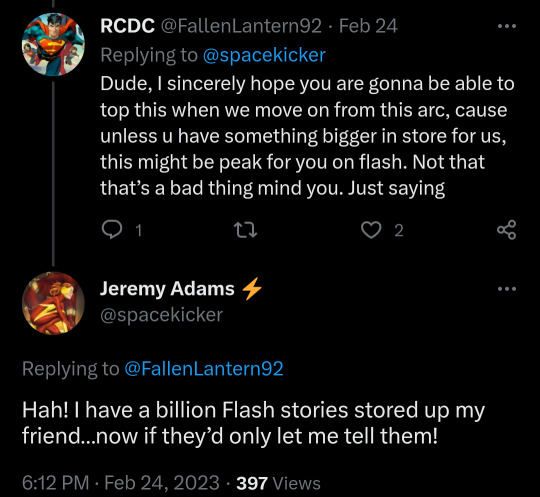
Ugh. Writing is on the wall for this one folks. I'm trying to remain positive but I will be surprised if Adams stays on the Flash series after the Flash #800.
#i am. incredibly confused.#they just gave him another book so he's still doing comics. plus he just got marvel books.#so hes definitely not done comics. and they're ongoings as well.#its possible he couldn't juggle them all and he dropped the Flash. but hes talking like DC is kicking him off not the other way around#but his Flash book is selling out??? and reprinting#its doing so well??? DC would have to be nuts to kick Adams off the Flash or cancel the series#if they cancel the Flash im done buying comics fr#my only thought is that they cancelled it or someone big wanted to write it and they couldn't say no#Mark Waid just came back to DC.... Johns is back.... Williamson is using Barry for something.... idk. itd have to be one of them#but i don't know that Waid and Johns would go back. they told their story. they certainly wouldn't kick Adams off the book#Williamson might. idk. he got a promotion so hed have the power to do so. he also is using Barry for something and keeps saying that#he wanted to use Wally and Bart but wasn't allowed to when he wrote the Flash. so he might want a second shot#but idk. pessimist in me is saying that its cancelled :(#dc#dc comics#the flash
63 notes
·
View notes
Text
Comic artists researches. Part 1
Frank Miller:


Frank Miller is an American comic book artist, comic book writer, and screenwriter known for his comic book stories and graphic novels such as his run on Daredevil, for which he created the character Elektra, and subsequent Daredevil: Born Again, The Dark Knight Returns, Batman: Year One, Sin City, and 300.
What is Frank Miller doing now?
On April 28, 2022, it was reported that Miller was launching an American comic book publishing company titled Frank Miller Presents, or FMP. Miller will act as the company's president and editor-in-chief, working alongside Dan DiDio as publisher and chief operating officer Silenn Thomas.
Did Frank Miller draw Daredevil?
He started out with minor tasks, like drawing covers and short stories for Spiderman anthologies. Then, at the beginning of 1979, came the big break: Miller became the official artist for Daredevil, one of Marvel's lesser-known series.
Who influenced Frank Miller?
Among his graphic influences were Neal Adams, Ernie Bushmiller, Guido Crepax, Will Eisner, Jack Kirby and Goseki Kojima. His made his debut in 1978 with contributions to Gold Key's The Twilight Zone. He soon also drew for DC anthologies and Marvel titles like 'Spectacular Spider-Man' and 'John Carter: Warlord of Mars'.
My opinion for this artist of his art style is very interesting for my opinion, that he uses some specific colours for different comic he made for Sin city, Daredevil and 300. As my point of view toward his comic is a mixed with a big art of scene in the comic and four small boxes to show what is going on with that scene which is very interesting to me.
╰── ⋅ ⋅ ── ✩ ── ⋅ ⋅ ──╯
John Romita Jr.:
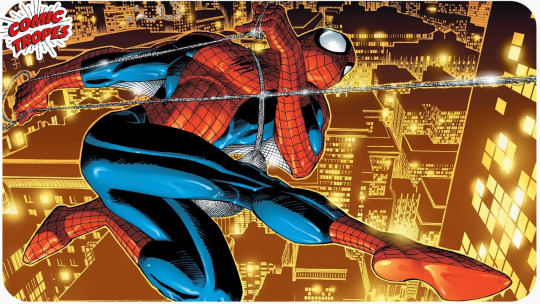
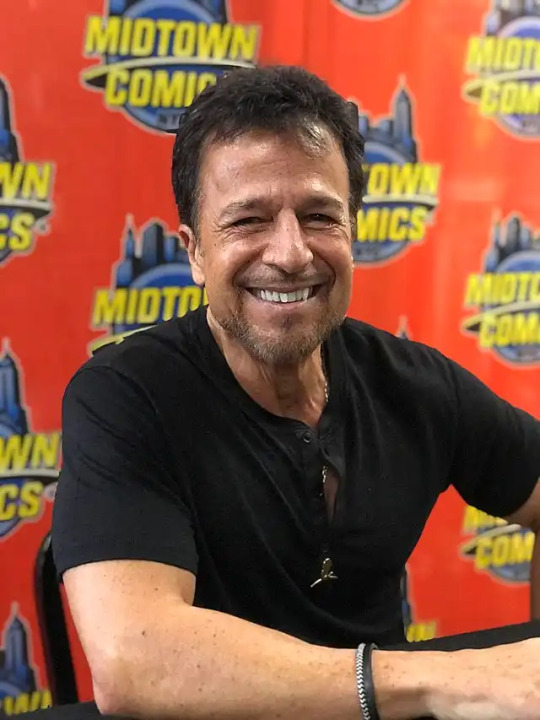
John Salvatore Romita is an American comics artist best known for his extensive work for Marvel Comics from the 1970s to the 2010s. He is the son of artist John Romita Sr.
When did John Romita Jr draw Spider-Man?
Romita Jr. made a name for himself as a key Marvel artist thanks in large part to his work on Spider-Man. He first drew the character in 1977, as the rising star son of the legendary John Romita Sr., and went on to become one of the definitive pencillers to ever work on the character.
What was the first comic of John Romita Jr?
Romita Jr. began his career at Marvel UK, doing sketches for covers of reprints. His American debut was with a six-page story entitled "Chaos at the Coffee Bean!" in The Amazing Spider-Man Annual (1977)
Is John Romita Jr back at Marvel?
He drew many of Marvel's greatest characters, and then moved to DC for a short period, where he also drew their greatest characters. John Romita Jr. has since returned to Marvel, getting his old job on The Amazing Spider-Man back.
My opinion for this artist of his art style is very pop culture-like as he is uses pop colours for example, red, blue, orange, yellow, etc. As he worked for Marvel as he did his work on Spider-Man as he first dew the character in 1977 as he is going to work back on the Spider-Man for Marvel.
╰── ⋅ ⋅ ── ✩ ── ⋅ ⋅ ──╯
Brian Bolland:
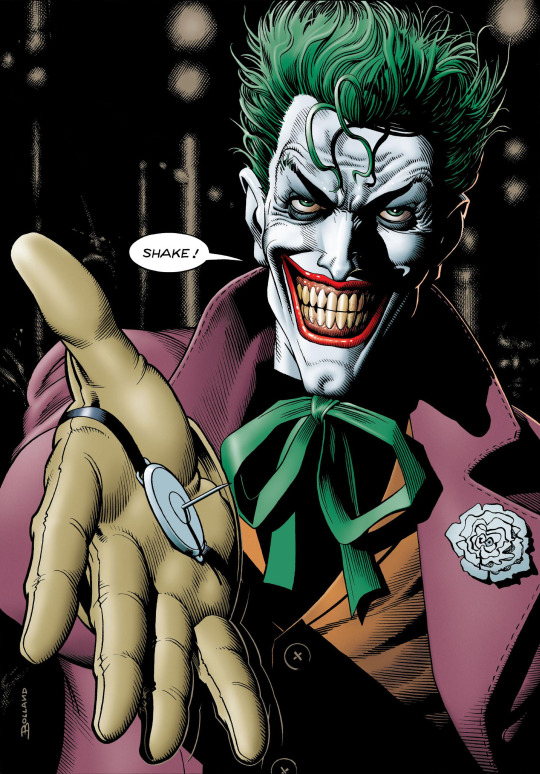
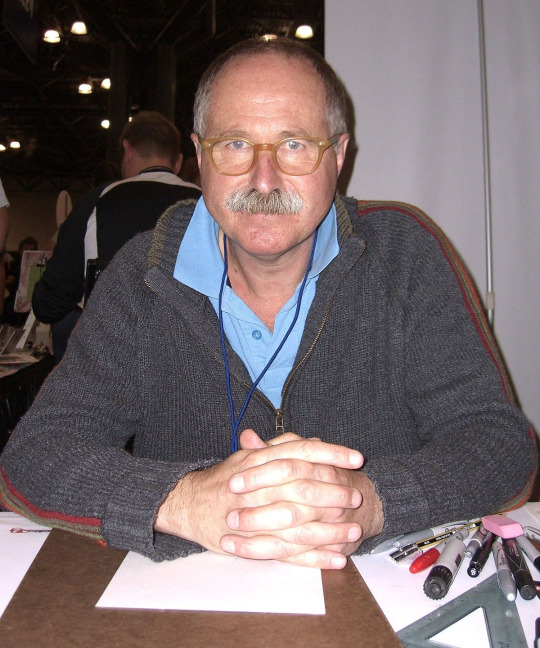
Brian Bolland is a British comics artist. Best known in the United Kingdom as one of the Judge Dredd artists for British comics anthology 2000 AD, he spearheaded the 'British Invasion' of the American comics industry, and in 1982 produced the artwork alongside author Mike W. Barr on Camelot 3000, which was DC Comics' first 12-issue comicbook maxiseries created for the direct market.
What inspired Brian Bolland?
As early as 1962, aged 11, Bolland remembers thinking that "Carmine Infantino's work on the Flash and Gil Kane's on Green Lantern and the Atom had a sophistication about it that I hadn't [previously] seen." He would later cite Kane and Alex Toth as "pinnacle[s] of excellence," alongside Curt Swan, Murphy Anderson
You'll be surprised to hear that even though Judge Dredd had been in 2000AD since Prog 2 the editors weren't sure which of the interior characters would sell the comic best if that character was on the cover. Artists like me just came up with cover ideas and, if they liked them, we'd draw the cover and they would write a one-page text story based on it to go inside. These early covers of mine fall into that category.
Other covers followed for nearly a third of the first 30 progs, as well as stand-alone pages and some inking duties on Gibbons' Dan Dare. Already familiar with Nick Landau (acting editor), when another artist dropped out, Bolland was called directly to complete a Judge Dredd story in Prog 41 (3 Dec 77) and soon was established as a regular artist on the series. "From that point on," writes Bolland, "either he [Landau] or his successor Steve MacManus called me direct whenever they wanted me to do a Dredd story."
Bolland's early work on Judge Dredd was much influenced by McMahon, a talented newcomer whose idiosyncratic style was fuelling the interest in the new character. Bolland thought McMahon was "terrific, the real ideas man on Dredd," but noted that McMahon's approach was "very impressionistic," while the "average comics reader, certainly at the time, does tend to prefer realism." Bolland therefore states that he "aped Mike's genius... and then reinterpreted [Dredd] in a style which actually borrowed a lot from the work of the American artists," retaining McMahon's "granite-jawed" look but bringing a level of realism and fine detail to the character, which Mark Salisbury says "finally cemented the iconic image."
My opinion for this artist of his art style is horrific but in a good way as he is showing us in the comic with joker and batman as showing the Joker a villain in a horrific, disgusting and creepy style as he is showing toward us in world that the style of his is amazing as he did a well done of showing the art style on the comic book to show what horrific is it.
╰── ⋅ ⋅ ── ✩ ── ⋅ ⋅ ──╯
0 notes
Text
If you’ve ever had the dream of owning every comic DC has published — which currently number more than 40,000 — then get ready for a great opportunity. Sotheby’s auction house will be selling the “Ian Levine Collection,” which contains a copy of the publisher’s entire output from 1934-2016.
With the current rise of Facsimile Editions, more fans have had the opportunity to get a taste of comics history. Click over to Sotheby’s to look at the whole auction catalog of what’s sure to be a record-breaking sale price. The auction record for a comic was achieved in 2014 when Action Comics #1 alone sold for $3.2 million back in 2014; Detective Comics #27 hit $1.075 million in 2010.
Here’s the press release:
Sotheby’s is pleased to announce that we will offer DC Complete: The Ian Levine Collection, an exclusive private sale offering of every comic book released by American publisher DC Comics from 1935 – 2016, including complete runs of Superman, Batman, Action Comics, and Detective Comics. The more than 40,000 comics in the collection also features superhero icons Wonder Woman, The Flash, Green Hornet and Aquaman, as well as the Justice League series. Available now and on view on Sothebys.com, the sale marks the 81st anniversary of the release of Detective Comics #27 on March 30, 1939, which featured the debut of The Batman. For a comprehensive overview of the collection or to inquire about its purchase, visit here.
The Ian Levine Collection of DC Comics – the most comprehensive in the 80 year span – was amassed over half a century that spans the birth and development of superhero comics as cheap forms of entertainment to pop culture juggernauts. From New Fun #1, the very first DC comic book published in 1934, to complete collections of Superman and Batman, the collections also includes first appearances of Wonder Woman, Aquaman, Green Lantern, the Flash, Martian Manhunter, Plastic Man and more; superhero teams such as the Justice League of America and the Teen Titans; and supervillains Lex Luthor, the Joker, Two Face, the Penguin, General Zod, and more.
Richard Austin, Head of Sotheby’s Books & Manuscripts Department in New York, commented: “The Ian Levine Collection is the holy grail for comics collectors. Amassed over decades of hunting, Levine’s collection embodies the passion and fandom that has defined comics culture for generations, which today is best encapsulated not through printed issues but popular superhero films that regularly break box office records. Featuring some of the most valuable individual books as well as extremely rare promotional issues, the Levine Collection includes all the DC heroes that are among the most recognizable and versatile pop culture touchstones in the world.”
A significant figure in modern pop culture himself, Levine is a DJ and producer, early popularizer of the Northern Soul movement, and one of the originators of Hi-NRG music. He was first introduced to DC when he began reading The Justice League of America as an eight-year-old in 1960. Upon discovering London comic shops Dark They Were and Golden Eyed in 1972, Levine realized it was possible to find long-out-of-print issues and discontinued titles such as The Justice Society of America, a Golden Age forerunner of his beloved Justice League, thus sparking his half-century of comic book collecting.
For a decade, Levine purchased a new copy of every DC issue he could find, while trying to fill in earlier issues. However, in pre-internet 1987, Levine despaired of finding many Golden Age comics he lacked, and decided to sell many of his best issues in order to fund his collection of Northern Soul records and Doctor Who film prints. However, reviewing his stacks of comic books with the purchaser reawakened his passion for this pop art form, and Levine bought his comics back from the dealer he had sold them to—at a 50% premium. Amassing about half of the comics DC had ever published, Levine determined to form a complete collection. Sacrificing his incomparable collection of Northern Soul records and Doctor Who prints, along with the assistance of the nascent internet (including the discussion forums of Certified Guaranty Comic, a comic book grading service) and dealer, advisor, and author of The Comic Book Paul Sassienie, he achieved this ambition, which would essentially be impossible to replicate. In 2010, Levine’s paramount, unique collection was utilized to supply the illustrations for Taschen’s monumental publication 75 Years of DC Comics: The Art of Modern Mythmaking by Paul Levitz, the former president and publisher of DC.
The collection spans the nine decades tracing the trajectory of the effect of comics on popular culture, from the target of a congressional investigation of their corrupting influence to the topic of doctoral dissertations addressing issues like war propaganda, environmentalism, and gender identity. Every comic genre published by DC is included, such as humor, parody, romance, crime, science fiction, and adaptations of classic and popular works of literature and film. The work of successive generations of the greatest comic book artists and writers are preserved in the collection, from pioneers such as Jerry Siegel, Joseph Schuster and Jack “King” Kirby; to those who maintained the quality and passion of the books through the Silver Age including C. C. Beck, William Moulton Marston, and Sheldon Mayer; to those who carried on the tradition through the Bronze Age and into the twenty-first century such as Neal Adams and Curt Swan.
Although National Allied Publications, DC’s predecessor firm, had been publishing comics since autumn 1934 with New Fun: The Big Comic Magazine #1, Superman’s debut in Action Comics #1 (June 1938), sparked a new era not only in comic books but in global pop culture, with superheroes exerting enormous influence on film, television, and fashion. Superman was soon joined by a radically different superhero than the alien man of steel, but equally as significant and influential: Batman (originally, the Bat-Man), who first appeared in Detective Comics #27 (May 1939). Shortly after, National Allied Publications adopted the initials of this popular title for the company brand that is still recognized the world over: DC. Representing the pinnacle of the Golden Age of comics, these two seminal characters would soon be joined by an expanding roster of several hundred celebrated superheroes and serialized stories.
The Levine Collection is highlighted further by hundreds of rare promotional comics by DC artists and writers, featuring various DC (or DC-inspired) characters endorsing various consumer goods and corporate entities; a number of “ashcan” issues (intended to establish copyright but not available for sale), as well as many foreign (non–United States) reprints, British comic books featuring appearances by DC characters, and anthology reprints in proper book form.
Sotheby’s To Auction Every DC Comic 1934-2016 If you've ever had the dream of owning every comic DC has published — which currently number more than 40,000 — then get ready for a great opportunity.
7 notes
·
View notes
Text
Why I’m Excited for “Crisis On Infinite Earths”
With the premier of the “Crisis On Infinite Earths” fast approaching, I recently began to reflect on why I’m so excited for it. Sure, I’m an avid Superman and DC comics fan and Crisis is an iconic story, but it’s more than that.
If you were to ask me “When did you know you were a Superman fan?” I would say, “Somewhere between 7 and 8 years old when my upstairs neighbor gave me his copy of The Death of Superman trade paperback.” Of course, at that age, I didn’t know what a “trade paperback” was. To me, it was a comic book; and like so many other children have done with their favorite comics, books, and toys, I carried it everywhere and read it to the point that I nearly had it memorized. I still have it. It’s beat to hell; but it’s bagged, boarded and stored in a safe place.
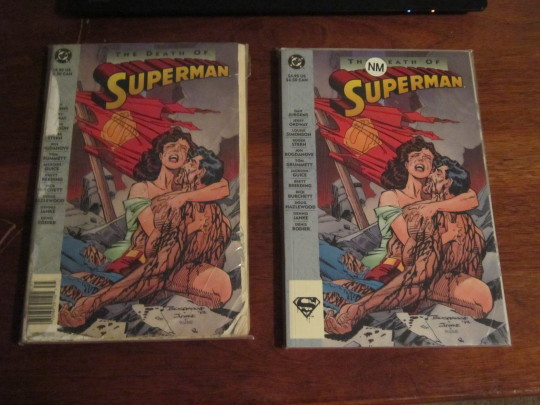
My copies of The Death of Superman TPBs. The one on the left I took everywhere with me when I was a boy.
If you asked me when I became a serious Superman fan and collector I would tell you “My 14th birthday, February 2000.”
My Aunt Susan gave me the Superman Masterpiece Collection for my birthday that year. The set came with a reprinted copy of Superman #1 (printed to the exact specifications of the comic books of that era), a hardcover book chronicling Superman’s Golden Age, and a limited edition statue designed by Alex Ross, made available only with that set.
I still have that, too. It’s a little worn along the edges and corners, but otherwise in excellent shape. I keep it on top of my bookcase. It’s one of my favorite pieces of memorabilia.
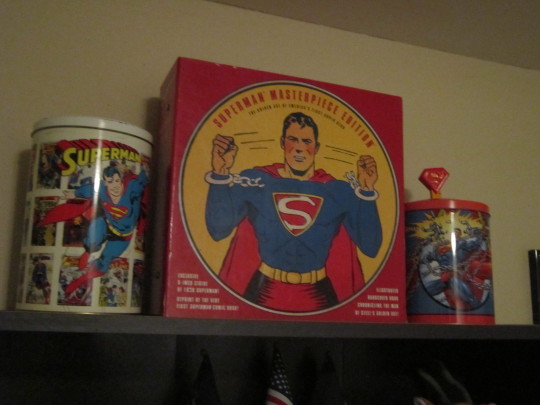
Even then, as much as I enjoyed comic books, I only saw them as a form of escapism; another way to keep people entertained. With explosions, science fiction, action, adventure, and romance; it was the modern version of the Greek mythology stories I read as a boy. They were a great way to keep myself entertained but not much else.
That perception changed when shortly after I graduated high school in 2004. I had received, among many other gifts, Barnes and Noble gift cards at my graduation party; and when I redeemed them, there were only two books I had my eye on:
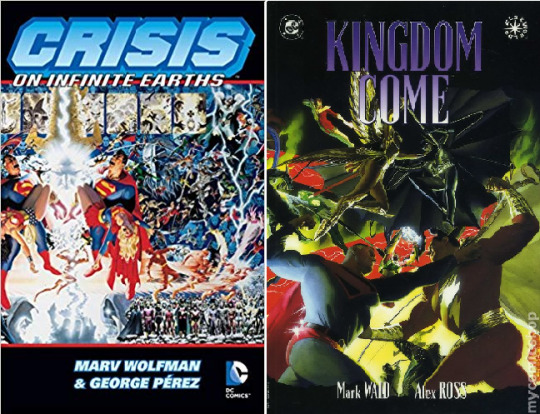
Crisis On Infinite Earths (1985) and Kingdom Come (1996)
Crisis on Infinite Earths brought a new perception to these fictional characters that I had never before considered. There was depth, drama, and serious world-ending – in this case universe-ending – stakes. Universes were literally obliterated from existence , beloved characters were killed off, and the DC Universe was never the same again.
George Perez even introduced a character, Pariah, whose sole purpose was to witness the destruction of every universe, particularly every Earth, with no way to warn or save anyone. I even remember my jaw dropping at the beginning of the story when Earth 3, the home of the Crime Syndicate of Amerika – evil alternate versions of the Justice League, kicked off the story by being destroyed.
Crisis on Infinite Earths saw the teaming up of characters of the same name from different Earths with similar, but still different, backstories and abilities. The Superman of Earth 2, for example, was the Golden Age Superman; who’s abilities are limited to that of early Superman stories, “faster than a speeding bullet, more powerful than a locomotive, able to leap tall buildings in a single bound.” While the Earth 1 Superman was the modern incarnation with all of the abilities we are familiar with today, namely flight.
What made Crisis so successful, however, wasn’t just that there were variations of the same characters fighting side-by-side to save the multiverse from being wiped from existence, but that no one is safe. One of the most iconic covers of all-time is Crisis on Infinite Earths #7.
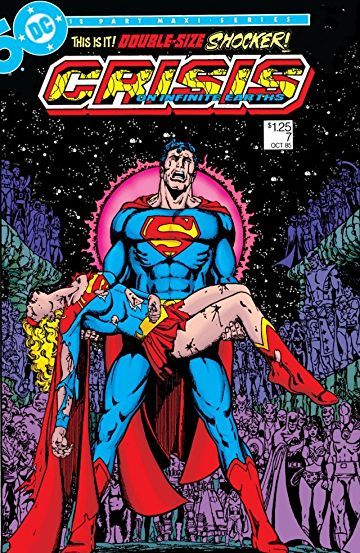
Cover of Crisis On Infinite Earths #7.
That basic design, a hero holding the body of a partner/friend/lover, has been used all throughout comic books; but Crisis on Infinite Earths #7 remains iconic not just because it features the world’s most powerful hero holding the dead body of his cousin, who’s abilities are nearly equal to his, reduced to a groveling mess, but because it was proof that absolutely no one was safe. By issue 7, everyone knew the stakes, and the heat was on.
What made Supergirl’s death so memorable and iconic, however, wasn’t just that she died in battle, but that she sacrificed herself, knowing what she was doing would kill her.
Following Crisis, DC rebooted the entire universe and in that reboot, they intended the Superman to be the last Kryptonian rather than the last son. So rather than letting Supergirl become another faceless casualty, she received a hero’s farewell by protecting her cousin - the entire reason she was sent to Earth in the first place.
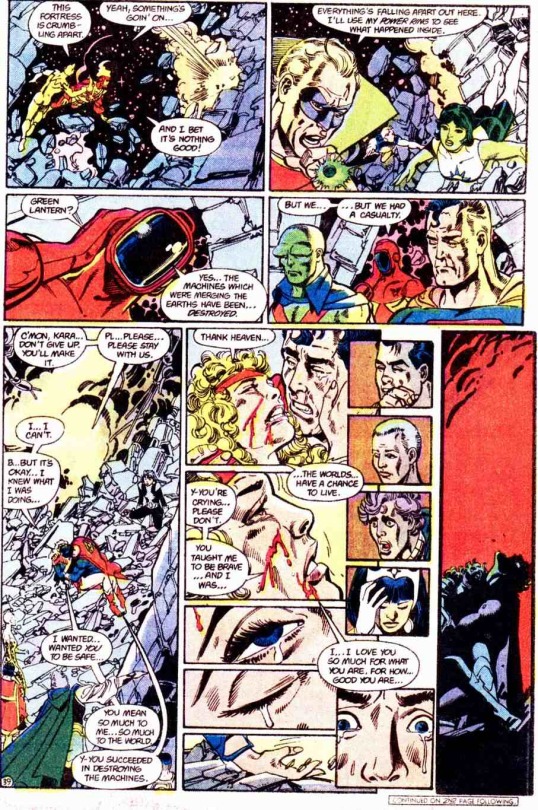
The death of Kara Zor-El.
The story didn’t slow down there, either, the following issue saw the death of Barry Allen, A.K.A. The Flash. While the cover isn’t nearly as iconic as the previous, Barry’s death is because it, again, involves self-sacrifice.
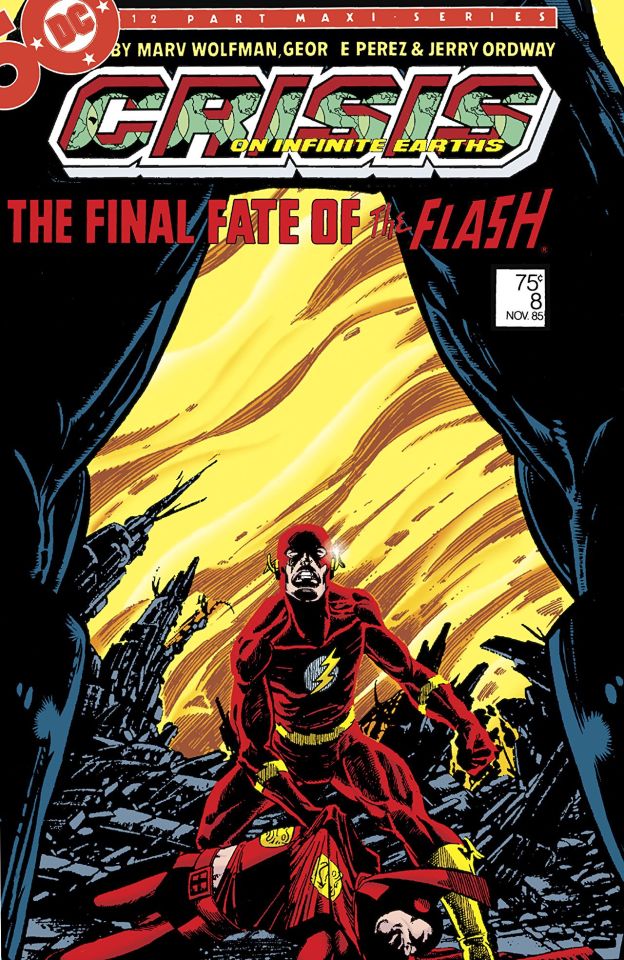
Cover of Crisis On Infinite Earths #8.
Throughout the story, Barry’s “ghost” would occasionally pop up, looking less and less ghastly each time; and that was finally explained in issue #8 when Barry ran to create a speed vortex that would draw power from the weapon designed to destroy Earth. The power became too much for his body to handle and he literally ran backwards in time until he disintegrated and became the very lightning bolt that gave him his abilities.
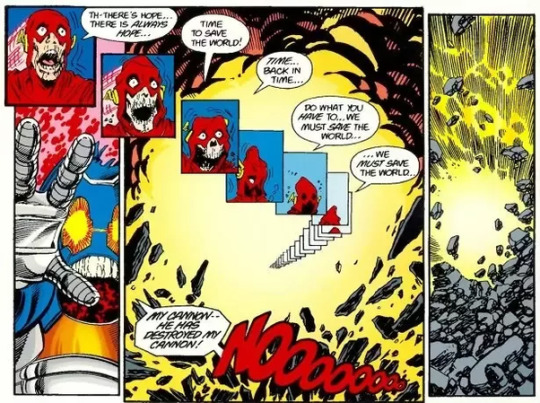
The Death of Barry Allen.
Crisis On Infinite Earths upped the ante in comic book storytelling. It showed that just because the characters aren’t real doesn’t mean they’re immortal and, more importantly, it shows that we can feel connected to them just like we get with a character in our favorite TV show. When I finished reading Crisis I began to take a deeper look at comic book characters and was able to identify what made each character great and different in their own way. Sure, Batman has the money, gadgets, and the car - but it doesn’t mean he won’t long for his parents anytime he sees Superman with Jonathan and Martha. There is much more to comic books than colorful costumes and wacky villains; and it was Crisis On Infinite Earths that helped me realize that.
After Crisis, I picked up Kingdom Come.
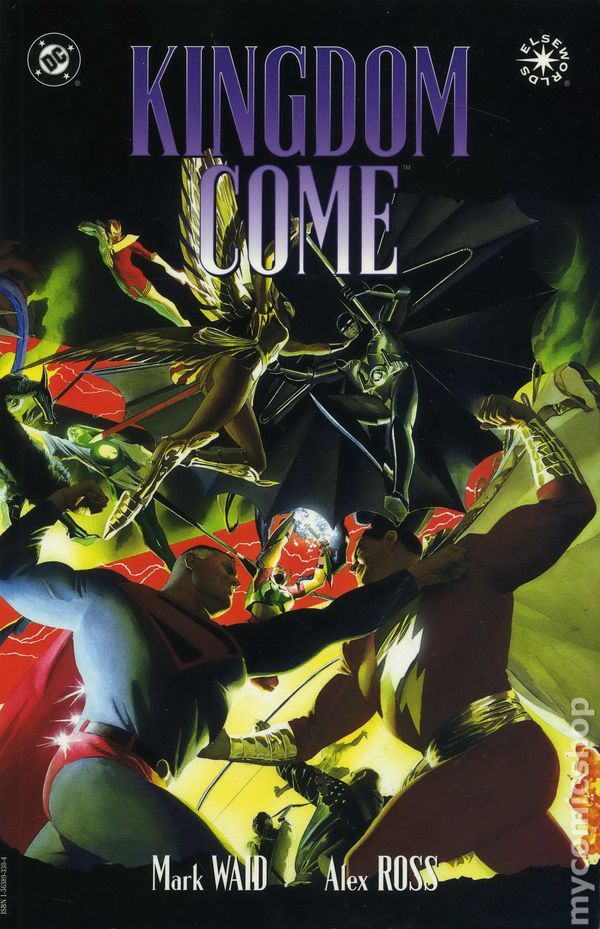
Wow.
Let me say that again.
Wow.
Putting aside the writing for now. The art alone is enough to sell the book. Alex Ross is a legend, and his art speaks for itself. I had only ever seen his work in single images, not in comic book panels and I was in awe with how well everything seamlessly flowed together. To this day, Alex Ross’ work in Kingdom Come is among my favorites and will always hold a very special place in my heart.
Now. The story.
Mark Waid could walk into a convention and my heart would stop.
He ranks among some of the very best comic book writers and when you read Kingdom Come, you’ll see why.
Like Crisis On Infinite Earths, Kingdom Come opened my eyes in comic book storytelling that I had never before considered; this time with politics. In my last YouTube video, I talked about how comic books have always been, in some way, political. As children we don’t notice it as much but when we grow, mature, and begin to notice how the world works, we finally become aware of topics we were blissfully unaware of as children. Politics in comic books is one of them.
With Kingdom Come the politics covers not only generational gaps between yesterday’s heroes and the story’s current heroes, but we also see the government get involved out of fear of the destruction the two groups of heroes could cause should they not resolve their differences. Within that narrative was the conflict occurring among the primary characters. Superman and Wonder Woman, while working together, did not see eye-to-eye, Batman wanted nothing to do with their efforts while (shockingly) assembling his own team in accordance with his own plan that involved Lex Luthor and other classic supervillains, and a brainwashed demigod as the wildcard.
Most of all, the story portrayed a war and how the biggest victims aren’t those fighting in it, but those they claim to be fighting for; the unintended casualties. Sure, we feel for the casualties of the war, but it wasn’t until an enraged Superman nearly brought the roof down on the government who did what they did not out of malice, but fear.
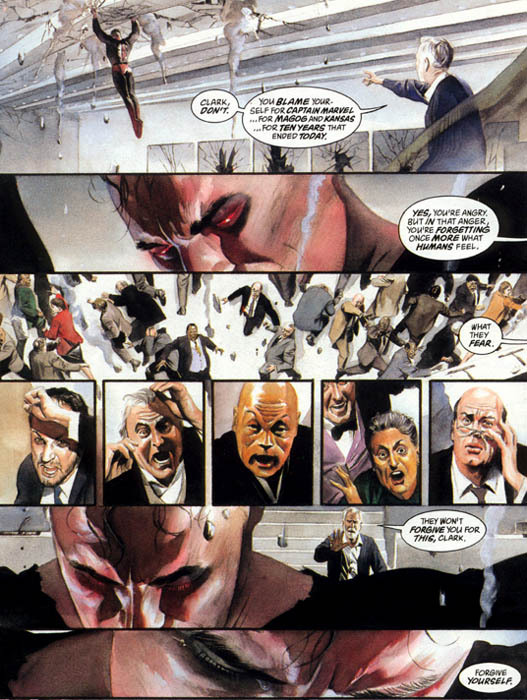
Superman nearly loses control in Kingdom Come #4.
Kingdom Come is easily one of the most powerful stories I have ever read and remains in my top 3 favorite stories. It’s one that I would recommend to anyone, even if they aren’t a comic book fan. Hell, the first Superman shirt I ever bought for myself was Kingdom Come.

I need to get a new one.
Then there’s Brandon Routh.
Routh (rhymes with “south”) was cast to play Superman in 2006’s Superman Returns. While the movie itself was a bit of a disappointment and divisive amongst fans, Routh’s performance as the Man of Steel was not.
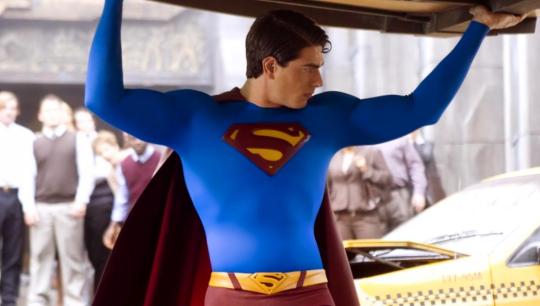
Brandon Routh as Superman in 2006’s Superman Returns.
I was 18 and in my first semester of college when the news of Routh’s casting hit. I was excited. Excited that he was an unknown actor. Excited that he was young and that a franchise could be built around him, excited that he grew up a Superman fan, excited that – like me – he grew up in a part of the country where Superman’s values are ingrained in everyday life. I was truly excited, even if other Superman fans weren’t.
Brandon Routh received, in my opinion, an unfair amount of criticism when he was cast, when pictures of him in the suit were released, when trailers were released, when the movie was released, and even to this day. Honestly, I feel fans and critics weren’t willing to give him a fair chance because he wasn’t Christopher Reeve and was compared to Reeve before the first picture of him in the suit was released. I was one of those fans who tirelessly defended him on the internet. I was insulted by fans, my family was insulted, called names, I was even accused of not being a “real Superman fan” because I was giving the movie my support. I was young, though, and didn’t realize then how pointless it was to argue over the internet; so I kept at it.
I was so excited for the movie I ordered my ticket for opening day the day tickets went on sale. I set out the Superman shirt I wanted to wear to the movie, drove an hour and a half from Limon, CO to Denver to see it, and arrived early to make sure I got a good seat. I had waited my entire life to see Superman on the silver screen and nothing was going to stop me from making it the best experience possible.
I’ll be honest. I enjoyed the movie. I was a bit underwhelmed because I had hoped for more action sequences and felt the story could have been stronger; but that didn’t stop me from walking out of the theater with a smile on my face, seeing it a second time, or looking forward to what the sequel had in store. Hell, at the time Superman Returns came out, I was an aspiring actor and I DREAMED of being cast as John Corben, also known as Metallo, in the Superman Returns sequel and going blow-to-blow with Routh’s Superman.
Ultimately, I think the premise had more to do with my excitement than anything else. I loved – LOVED – the idea of Superman being gone for 5 years and returning to a different world; especially with everything the world had been dealing with between 2000-2006.
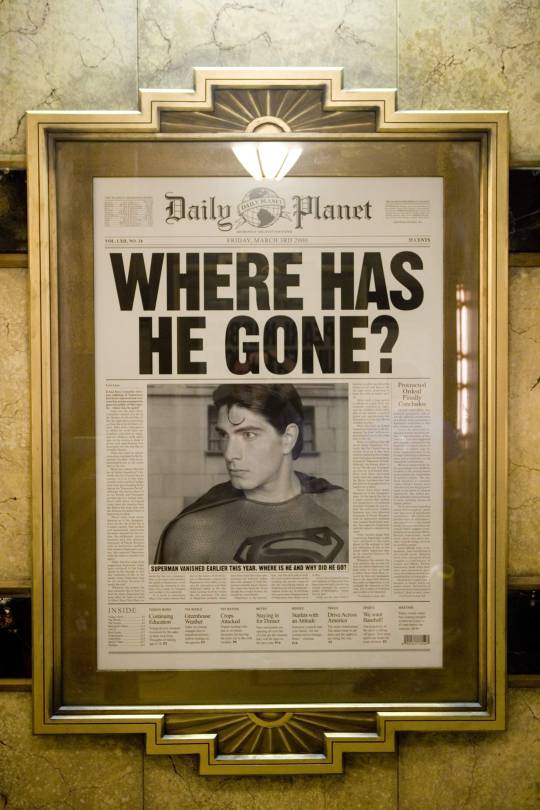
From Superman Returns. The date of the article is March 3, 2000.
What if we had Superman on 9/11? What would have been different? How many lives would have saved? Would he have stopped the second plane from hitting the south tower? Would he have prevented it altogether? There was so much that could have been done with that premise that, I feel, was left on the table.
To this day, I believe that instead of being a continuation of the Christopher Reeve films (a decision I supported at the time) I think Superman Returns should have featured a young Superman who fled back to Krypton when he heard the rumor it might still be there. Jason should have been Lois and Richard’s child, Martha should have died while Superman was away, Lex Luthor or Cadmus Labs (both?) should have been trying to clone their own Superman that would turn into Bizarro, Superman should have spent less time pining over his lost love with Lois, and I have always, and firmly, believed there should have been a scene of Clark sitting alone in the Daily Planet film room, glasses in hand and tears in his eyes, watching footage of the September 11th terrorist attacks. Those elements would not only have given Superman Returns a stronger story, it would have made him much more relatable to the casual moviegoer and still would have provided plenty of action for fans.
Despite all of that. I still enjoyed the movie. I enjoyed it so much that when it was available for pre-order on Amazon, I bought the Two-Disc Special Edition.

I still have it.
When Routh made an appearance at Rose City Comic Con in 2018, I made damn sure I met him.

He signed my copy of the Superman Returns comic book adaptation and I’m still geeking out about it.
Of everything I enjoyed in Superman Returns, the plane sequence, the bank robbery, Kevin Spacey’s Lex Luthor, Superman flying around saving the city; if I had to pick one thing that I enjoyed the most in the film, it would be Routh himself. While his portrayal of Clark Kent was clearly inspired by Christopher Reeve, his Superman is where he shined. He stood tall, walked and spoke with confidence, and could intimidate someone by his presence alone – until he smiled that warm Superman smile and said something that would calm even the most nervous person like he did with an upset Lois Lane on the roof of the Daily Planet.
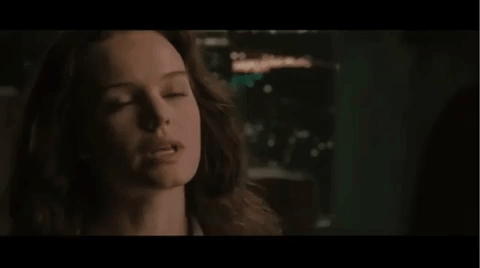
“Will I see you around?”
“I’m always around.”
Because Superman Returns didn’t fare as well in the box office as the studio had hoped, the sequel never happened and that was the end of Routh’s tenure as Superman. I was disappointed, but I understood. It’s a business. Making money comes first and Superman Returns, while profitable, didn’t make nearly enough.
Time marches on and we got more comic book adaptations. Smallville continued for another 5 seasons, ending its run after season 10 and inspiring a spin-off series about the Green Arrow, inspired by Justin Hartley’s popularity of the character in Smallville. Arrow, set apart from the Smallville series, came out swinging and quickly rose in popularity. Then in season 2, came future superheroes as recurring characters: Barry Allen, played by Grant Gustin, and Ray Palmer, played by Brandon Routh.
I was SO excited to see Routh back in the comic book medium. The only thing that would have made me happier was if they brought him back to play Superman; but alas, I knew it didn’t fit with Arrow’s reality.
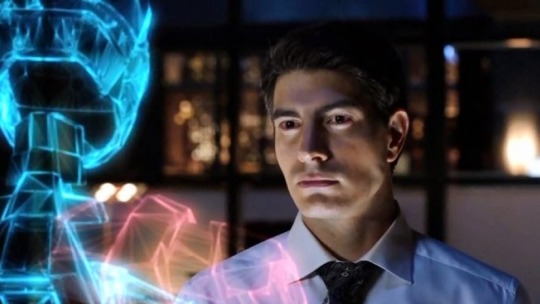
Routh’s performance as Ray Palmer was different than I expected. Ray always came off as a serious character in the stories I read, not as the “Aw shucks” kind of person Routh portrays him as. It made sense, though. Stephen Amell’s Oliver Queen had enough serious to go around for everyone; there needed to be a lighthearted superhero to balance that – like Superman is to Batman.
It worked too! Routh became popular on the show and before too long, was starring alongside other actors who portrayed those lesser known heroes in Legends of Tomorrow. As the Arrowverse continued to up the ante and bring in other shows and characters, so did the expectations; and like the comics the shows are based on, annual crossovers became a thing.
They started small with the first 2 being two-parters with The Flash and Arrow, then expanded across all four shows for Invasion! and Crisis on Earth X, dropped to a 3-parter with Elseworlds while also setting up the Batwoman series, to an epic five-part series based on one of the most iconic stories of all time that showed me how serious comic book storytelling could be.
Then there’s Brandon Routh.
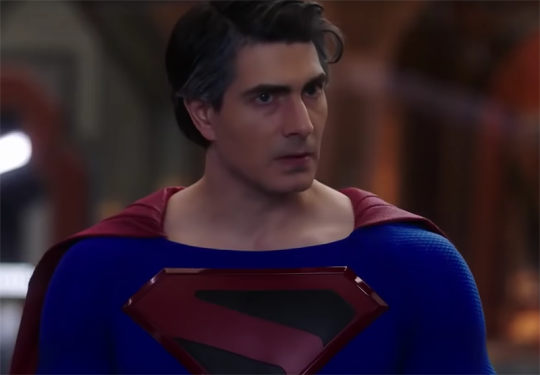
Not only is he returning to play Superman, he’s playing the Kingdom Come Superman!
I can’t take it anymore. Seriously.
The first actor I ever saw play Superman in theaters – the first Superman actor I have ever met in person, is playing the version of Superman that helped me realize the kind of message that comic books can tell, in an adaptation of an iconic story that showed how serious a comic book can get. Both of those stories, Kingdom Come and Crisis On Infinite Earths, made me into a comic book fan. Not just a Superman fan, but a comic book fan.
Now I have another comic book that I need to get signed by Routh the next time he visits the Pacific Northwest:

It’s gonna happen – and I’ll be sure to get a picture with him while wearing a Kingdom Come Superman shirt.
Fans can always remember what made them fans of their fandom. Crisis on Infinite Earths and Kingdom Come is that for me. Add the casting of Brandon Routh as Superman in Superman Returns shortly after reading those two iconic stories, and It was a done deal for me.
Seeing all of these impactful moments that helped mold my fandom being rolled together like this is, to say the least, emotional. Never in my life did I expect to see any type of live action adaptation of Kingdom Come or Crisis On Infinite Earths; and I certainly never imagined I’d see Brandon Routh play Superman again. It really is a fanboy’s dream come true.
The only thing that could make it better, for me anyway, would be if Routh’s final line as Superman is his best line as Superman:
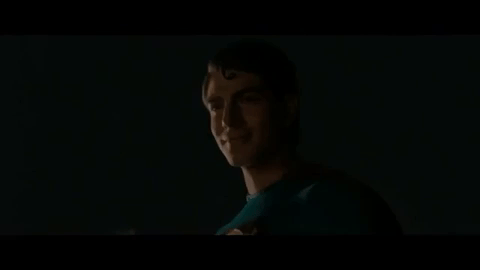
“I’m always around.”
#crisisoninfiniteearths#kingdomcome#superman#supermanreturns#arrowverse#arrow#flash#supergirl#legendsoftomorrow#brandonrouth#deathofsuperman#raypalmer#theatom#dccomics#cwtv#dctv#dcuniverse#dcmultiverse
2 notes
·
View notes
Text
More Superhero Comics, Revealing My Reactionary and Facile Engagement with Art as Little More Than the Accrual of Social Capital, Benefiting Nobody But Myself, 4/7/19
The League of Extraordinary Gentlemen Vol. 4: The Tempest #5 (of 6), Alan Moore, Kevin O’Neill, Ben Dimagmaliw, Todd Klein: This is an often very funny issue, set up like a pasted-together UK edition of old US pre-Code horror and crime comics, which, in addition to being funny, plumps up the page count as the plot moves maybe two or three tics forward in advance of the very-last-issue-of-LoEG-ever. The conservative in me wonders why we’re being this digressive in the penultimate number of the entire saga, but then -- at least since “The Black Dossier” -- this project has been more about positioning various strands of fiction and their accrued cultural baggage against one another than telling a propulsive adventure story. Anyway: the realm of Faerie, having easily survived an attempted nuclear strike on the collective imagination by a military-corporate black ops fiction squad comprised entirely of various revamps of James Bond, has brought in every character from every game, comic, cartoon, TV show, movie and book reality with everything for a HUGE apocalypse!
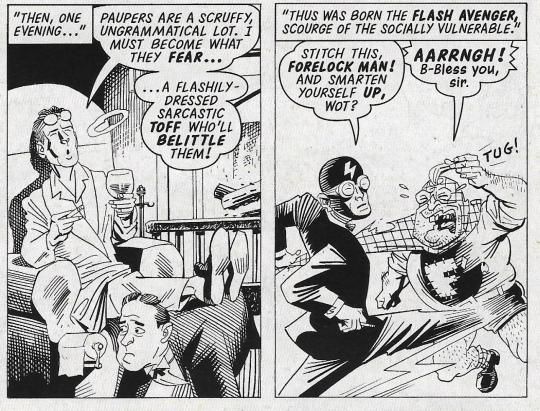
Scenes of bedlam involve: the life story of Victorian painter and murderer Richard Dadd; cameos by Stardust the Super Wizard and David Britton’s Lord Horror; the oeuvre of musician Warren Zevon, brought to terrifying life; a Corbenesque image of a nude muscleman’s massive dick flapping into battle in 3-D; Mick Anglo’s Captain Universe, presented by Moore in unmistakable evocation of his own Marvelman/Miracleman stories of decades ago; a ghost wearing the word CRIME on his head a la Charles Biro’s Mr. Crime, the greatest American comic book horror host; at least one figure from the annals of racist caricature firing powerful sound waves from his mouth; a monster named Demogorgon, the leviathan of Populism, which the heroes allegorically cross as a footbridge en route to a safehouse named the Character Ark; a page-long parody of Batman (via the forgotten UK superhero playboy character the Flash Avenger), describing his origin as motivated entirely by hatred of the poor; a text feature telling of UK comics artist Denis McLoughlin, who worked consistently since the end of WWII, never made enough money to retire, and spent decades as an elderly man drawing for survival on titles he hated, eventually taking his own life in his 80s; and the secret of what happened to all the British superhero characters after the midcentury, which is that they were all eaten by Capitalism, pretty much. I laughed a bunch, but if you think LoEG is tedious shit, this probably won’t turn you around.
*
Savage Dragon #242, Erik Larsen, Ferran Delgado, Nikos Koutsis, Mike Toris: The latest installment of the longest-running Image comic written and drawn by one of the Image founders, now deeply dove into problematic network tv drama stuff. The Dragon’s relationship with his partner Maxine is still strained in the wake of her sexual assault, a video of which the Dragon viewed in the police archives; meanwhile, the mother of one of the Dragon’s young children has been telling them all the truth about their parentage, further disrupting the peace of the household. Also, a formerly aggressive sex robot has joined the gang, dressed as an anime maid. And, the Dragon reluctantly teams up with the mid-’00s-vintage sexy heroine character Ant (which Larsen purchased from creator Mario Gully a few years ago) to foil a scheme by elderly elites to project themselves into the bodies of mythic gods in order to provoke the Rapture. Most interesting to me, however, is a bonus segment in which Larsen presents newly-lettered pages of his preliminary solo work on “Spawn” #266 (Oct. 2016), which would later be filled out by contributions from Todd McFarlane, colorist FCO Plascenscia, and letterer Tom Orzechowski.
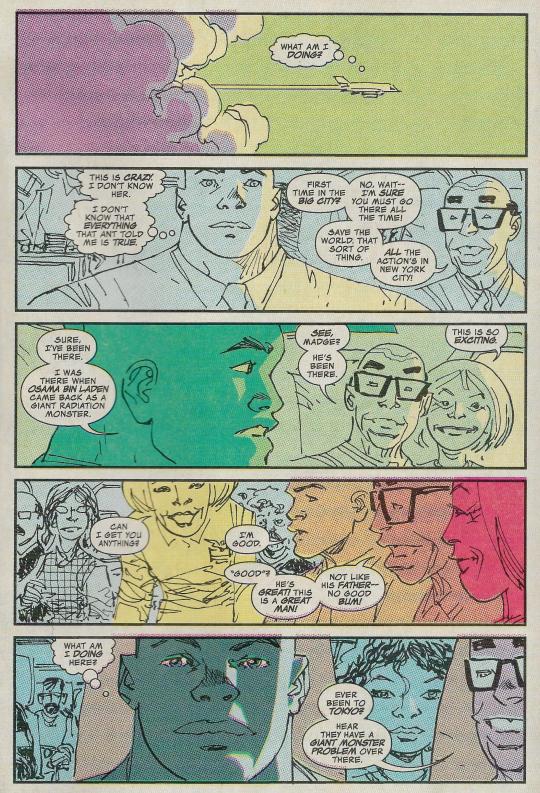
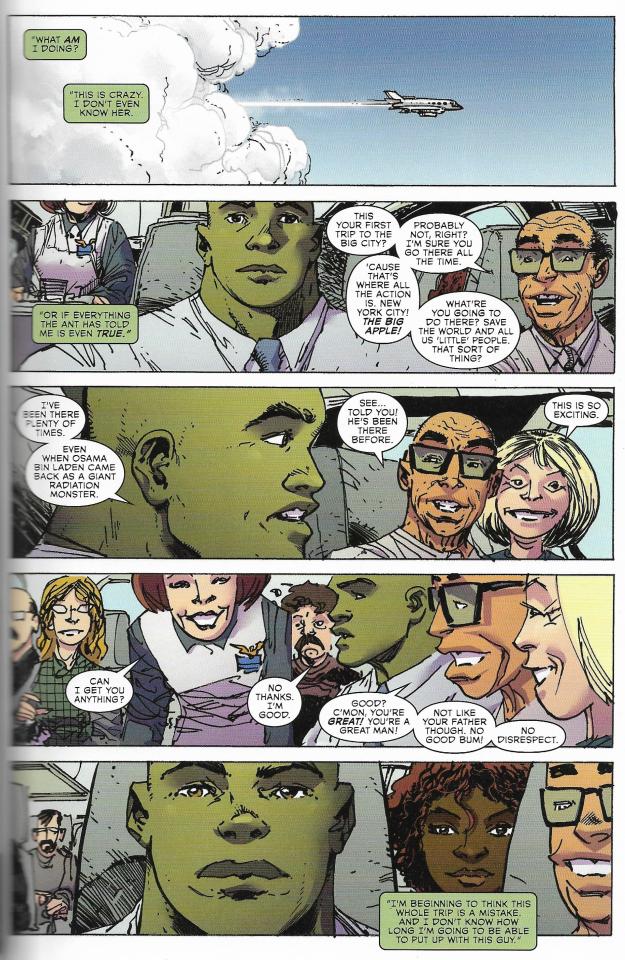
As usual, I prefer the ‘unfinished’ version (top) to the official release product (bottom).
*
Superman Giant #9, Erika Rothberg, ed.
&
Batman Giant #9, Robin Wildman, ed.
These are two of those 100-page DC superhero packages they sell for five bucks exclusively at Walmart (for now; later this year they’re gonna have them in comic book stores too), which marry one new 12-page story per issue with three full-length reprint comic books from elsewhere in the 21st century. I just wanted to know what was inside them. Here is what I found:
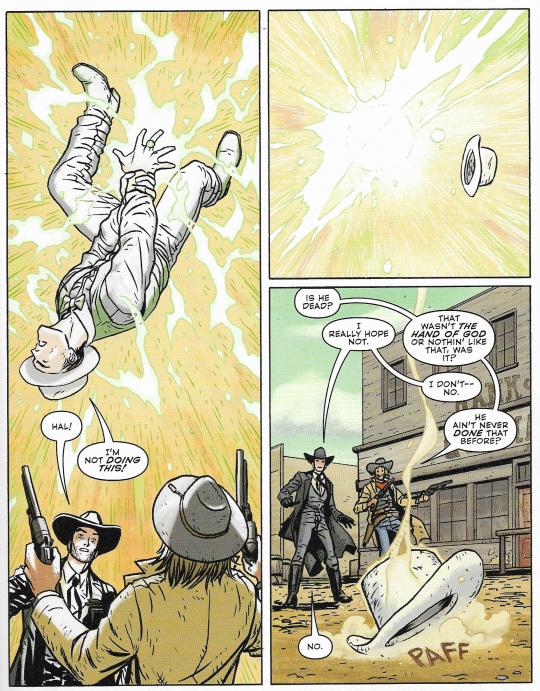
-The new Batman comic is written by Brian Michael Bendis as a very conspicuously all-ages prospect, where the story is about nothing more than what it’s about, and the title character is presented as a serious-minded but inquisitive and compassionate man of adventure. This issue -- just in time for the remix of “Old Town Road” featuring Billy Ray Cyrus -- Batman and Green Lantern travel back to the Old West, trade in their superhero outfits for cowboy clothes, and meet up with Jonah Hex. Nick Derington draws the heroes smooth and squinting with Swanian sincerity, and Dave Stewart colors it all bright and sunny. This is not my thing at all, but it’s confident to the point of acting like almost a rebuke to the rest of the book, where literally everything else is chapter whatever of a nighttime doom ballad drawn by either Jim Lee or something trying very hard to look like him.
-Like:
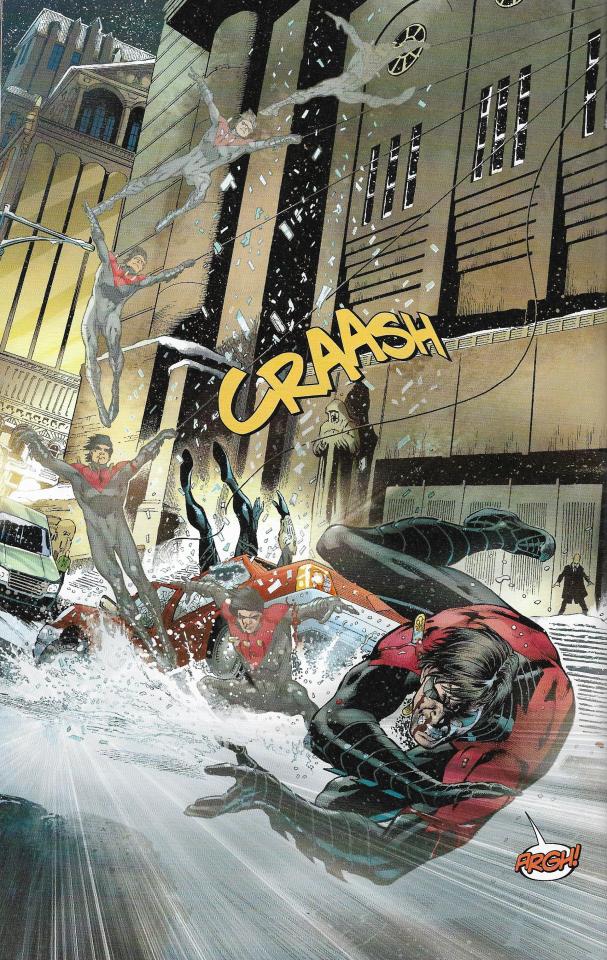
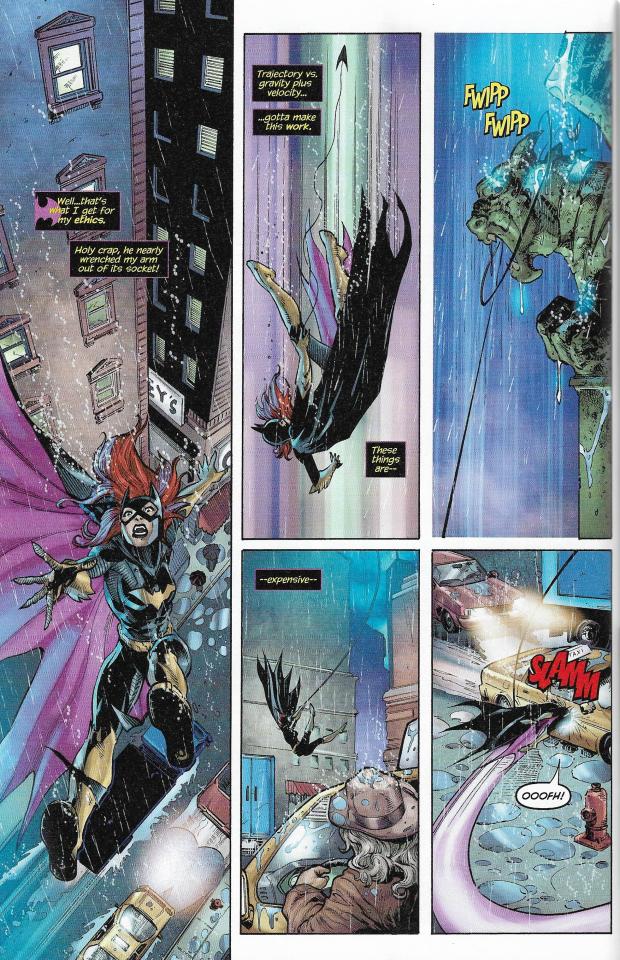
I can spot the differences, sure - if nothing else, reading superhero comics trains you to spot differences in otherwise similar things. But, there is absolutely an aesthetic at work. The top page is from an issue of “Nightwing” that tied into the 2012 “Night of the Owls” crossover in the Batman titles, produced by a seven-person drawing and coloring team fronted by pencillers Eddy Barrows & Andres Guinaldo. The writer, Kyle Higgins, has Dick Grayson fight his semi-immortal great-grandfather, who is an assassin for the Court of Owls: one of the more popular recent Batman organizations of villainy, presented here as a fascist group mediating society’s function through murder from the gray space between social classes. The Graysons, therefore, are the Gray Sons, but Nightwing resists the pull of destiny by winning a big fight, slinging the villain over his shoulder, and walking away toward a better future of just beating the shit out of bad people instead of killing them, I think. The Batgirl story -- from 2011, written by Gail Simone -- is comparatively orthodox, finding the character gripped with uncertainty about the superhero life and going about some downtime character-building activities, though most of it’s a big fight with a villain with a tragic past. The penciller, Ardian Syaf, kind of has trouble blocking the action so that characters’ movements are clear; I think Syaf is best known for having his contract with Marvel terminated in 2017 for slipping what were widely interpreted as anti-Christian and antisemitic references to Indonesian politics into an X-Men comic.
-There is a whole lot of Jeph Loeb among the reprints. He is not a writer who has been in critical fashion for much the past two decades, but he has undoubtedly sold a lot of comics for DC, and they probably feel he can do it again. The Batman book is serializing (deep breath) “Hush”, a 2002-03 storyline notable for its extraordinarily easy-to-solve central mystery, and generally being a taped-together excuse for Jim Lee to draw as many popular Batman characters as possible across 12 issues; it sold like hot cakes. The highlight of chapter 9 is probably a bit where a three person fight ends in one panel, and then one of the characters leaves, and then a second character wakes up from unconsciousness and also leaves, and then the first character comes back and nurses the third (also unconscious) character back to health, and then Batman arrives, all in the transition between the aforementioned panel and the next, which takes place in the same room; such is the befuddling desire to race ahead to more spectacle. Jim Lee (with Scott Williams and Alex Sinclair) is indeed Jim Lee (et al.) throughout, though at one point the team drops a howler of a swordfighting panel where Batman’s blade appears to grows to JRPG length due to what I think is the colorist filling two whoosh lines with the same hue as the swords.
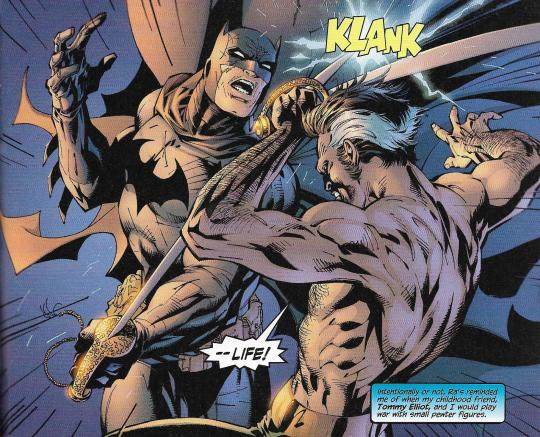
Meanwhile, the Superman book is serializing a 2004 storyline from “Superman/Batman” -- the series where Loeb has Superman describe the action on the page with his own Superman-branded captions, and Batman does the same with Bat-captions, and Superman says tomayto and Batman says tomahto -- in which the late Michael Turner, one of the rock star 2nd generation Image artists, illustrates a new introduction for Supergirl. But this isn’t quite the same comic that was originally published... can YOU spot the difference?
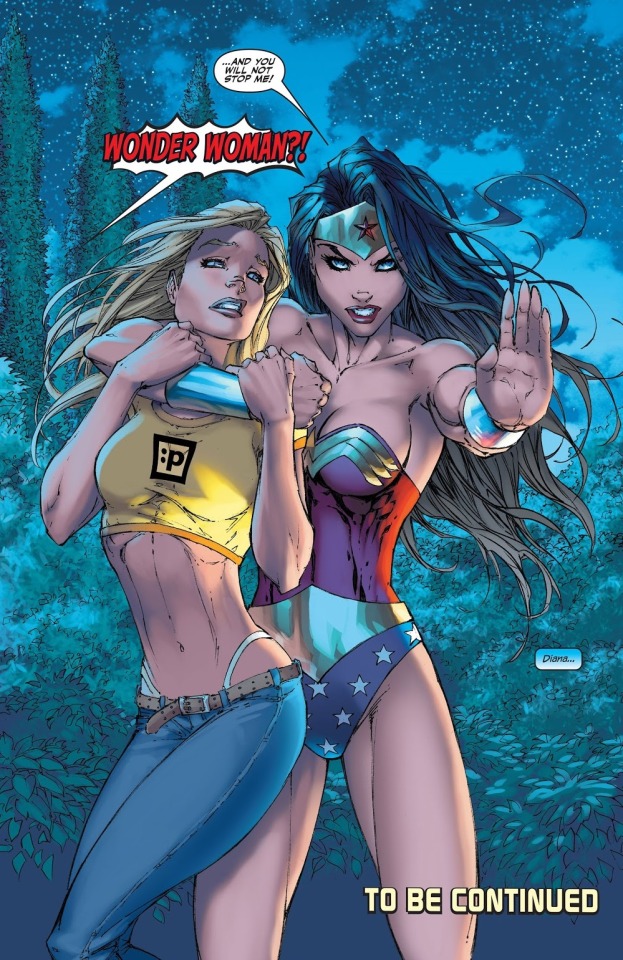
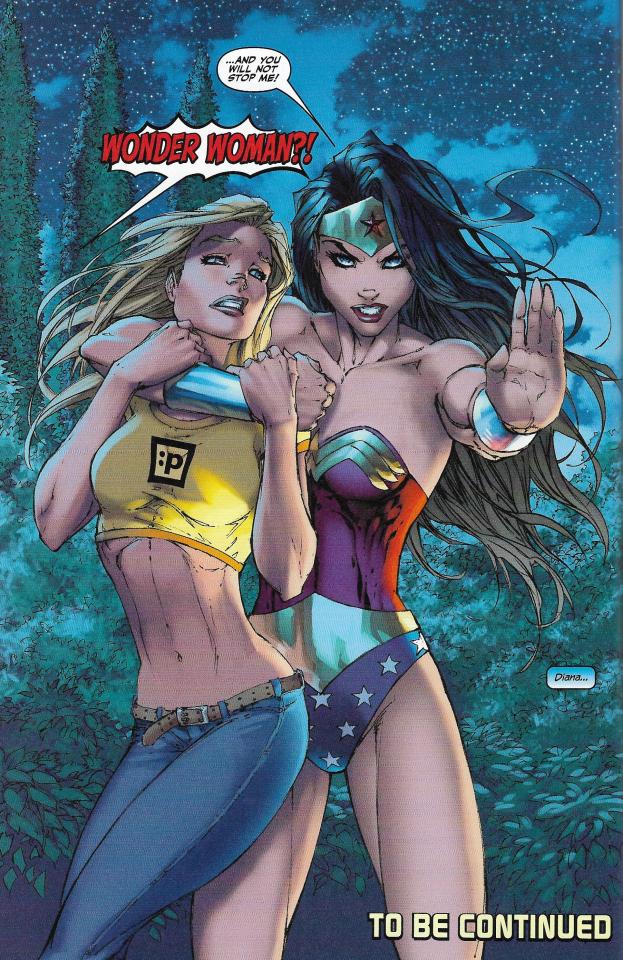
Is this like how Walmart won’t sell CDs that have an explicit content sticker, but with teen superhero g-strings? It’s hard to explain to younger readers how the low-rise/thong panties combo forever sealed the horniness of a generation of het male superhero artists into the late 1990s, and maybe DC doesn’t want to face that. Or, they’re just leery of how Turner slipping some peekaboo glimpse of Supergirl’s underpants or bare thighs into virtually every panel in which she is depicted below the waist might affect the marketability of the comic in 2019 - although I guess it could have happened in an earlier reprint somewhere too.
-The new Superman comic is a series of 12 splash pages depicting a race between Superman and the Flash. There is very little sense of speed, because Andy Kubert (inked by Sandra Hope, colored by Brad Anderson) draws the characters as frozen in time in a way that prioritizes muscular tension in the manner of contemporary superhero cover art; at one point the two characters part the sea with the force of their bodies, and it looks to me like they’re gesticulating in front of a theatrical backdrop. And, anyway, the story pulls back almost every other page to depict Batman standing on a ledge, or Lex Luthor in a sinister chair -- or some birds flying next to a building, or the Earth as viewed from space with streaks on it -- as the race occurs deep in the background or off to one side. The point is not excitement, but reflection, as imposed upon us by the between 13 and 21 narrative captions and/or dialogue balloons pasted atop all but the first page.
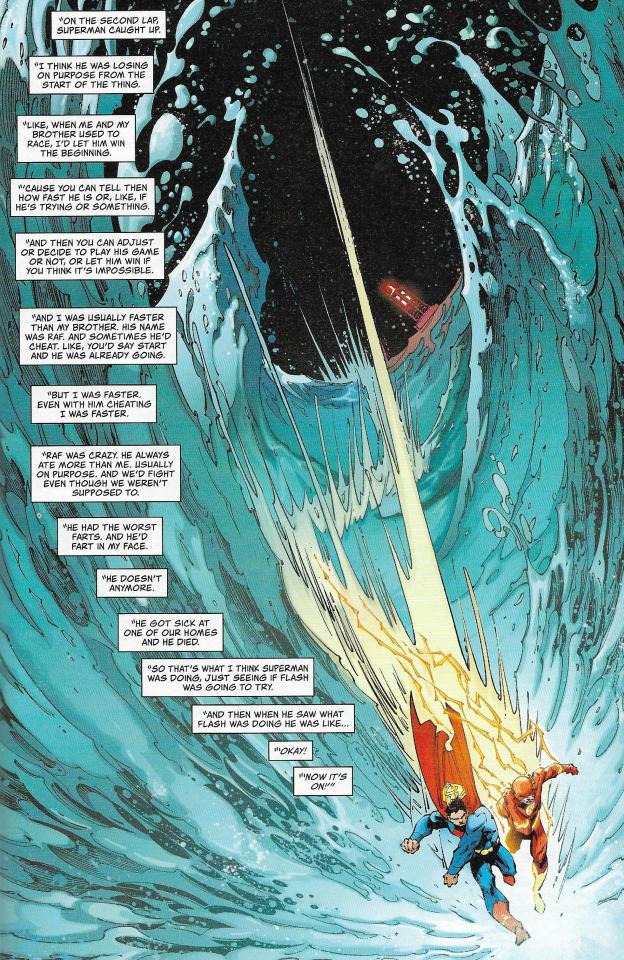
The writer is Tom King, whose “Mister Miracle” (with artist Mitch Gerads) gets a double-page advertisement later in the book, festooned with breathless blurbs from major media outlets. His narrator here is a little girl who is literally chained in captivity, clutching a Superman doll, and delivering her soliloquy in a manner of a superhero-themed TED talk with handclap repetitions on the nature of contradiction. Being faster than a speeding bullet is a CONTRADICTION. Being as strong as a locomotive is a CONTRADICTION. Leaping tall buildings in a single bound is a CONTRADICTION. Superman is about to lose the race, but then he wins, because to beat the Fastest Man Alive is... a contradiction. No wonder the GQ entertainment desk was blown away. DC comics do this kind of thing a lot, where they just have the writer tell you how great the characters are, and since you’re still reading superhero comics in the 21st century, you’re expected to pump your fists in recognition, because you and the writer and everyone at DC are just big ol’ fans... but I am not, because I am Jesus Christ, the only son of God.
-Elsewhere in the Superman book is an issue of “Green Lantern” from 2006, drawn by Ethan Van Sciver (inked with Prentis Rollins, colored by Moose Baumann), who is known today mostly as a conservative ‘personality’ online. He also netted more than half a million dollars last July in a crowdfunding campaign to make a 48-page comic book which he has not yet finished; funny to see an American right-winger on the French schedule. Funnier still to see the kind of people (mostly guys of a certain age) who mill around such personalities croaking about how diversity is ruining comics, because ALMOST EVERY FUCKING STORY IN BOTH OF THESE 100-PAGE BOOKS IS DRAWN BY EITHER SOME DUDE FROM THE 1990s OR SOMEBODY WORKING EXPLICITLY IN THAT STYLE, but - I guess when you’ve been pampered for so long, every paper cut feels like a ripped limb. Speaking of dismemberment, the writer here is Geoff Johns, who is often pegged as a superhero traditionalist, though he also has a grasp of gory pomp which occasionally pushes the comics he writes into a Venn diagram set with loud youth manga... at least in terms of how the action plays out, all broad and pained. So, needless to say, he’s currently writing “Doomsday Clock”, which is DC’s present attempt to extend the publication life of the valuable “Watchmen” property, so that they needn’t return it to the original creators, per the original writer, Alan Moore.
-To hear Alan Moore say it, the America’s Best Comics line was done on a work-for-hire basis as a means of ensuring prompt payment of the various creators from Jim Lee’s WildStorm, the original publisher. WildStorm was then acquired by DC (Jim Lee is now their co-publisher and chief creative officer), and Moore -- who has been (fairly) criticized in the past for taking ethical stances that cause financial harm to his artistic collaborators, who are in a less economically flexible position than writers in the comic book field -- allowed the line to continue under DC’s ownership, as to cancel everything would disadvantage everyone working on the titles. One of those titles, “Tom Strong”, was written by Moore and pencilled by Chris Sprouse for a while, and then there was a long line of guest creators, and then Moore and Sprouse came back when the ABC line wrapped, so that the concept could reach its logical termination point in an apocalyptic manner... Moore does love an apocalypse. The final story in the Superman book is a very recent, late 2018 issue of “The Terrifics”, in which we find an attempt to revive the DC-owned Tom Strong characters as players in broader DC stories. Jeff Lemire & José Luís are the primary creators. Jack Cole’s Plastic Man is there, as well as the John Ostrander/Tom Mandrake version of Mister Terrific. It’s a lot of offbeat characters; we even see Moore’s own parody of Hoppy the Marvel Bunny, because, I mean, Alan Moore does a lot of riffs on preexisting characters too, right? It’s a big blob of cartoon whimsy, filled with available characters running around. If they’re available, you might as well roll ‘em out, off the new releases rack and into a supermarket reprint package stacked in a box next to squeeze toys and discount Pokémon merchandise, which I bought, because it was really cheap.
-Jog
18 notes
·
View notes
Photo

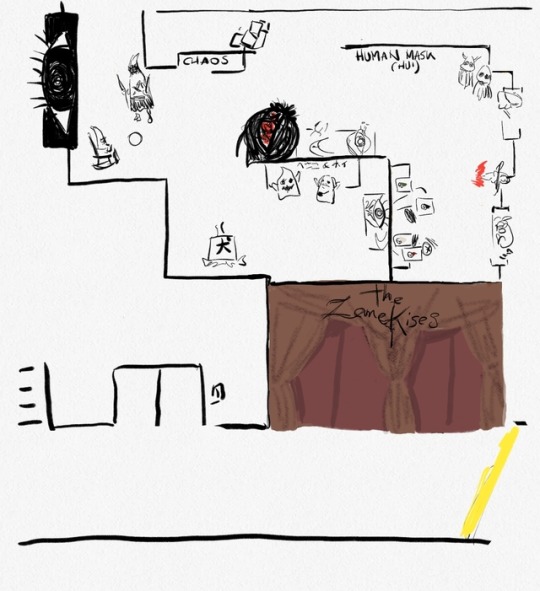
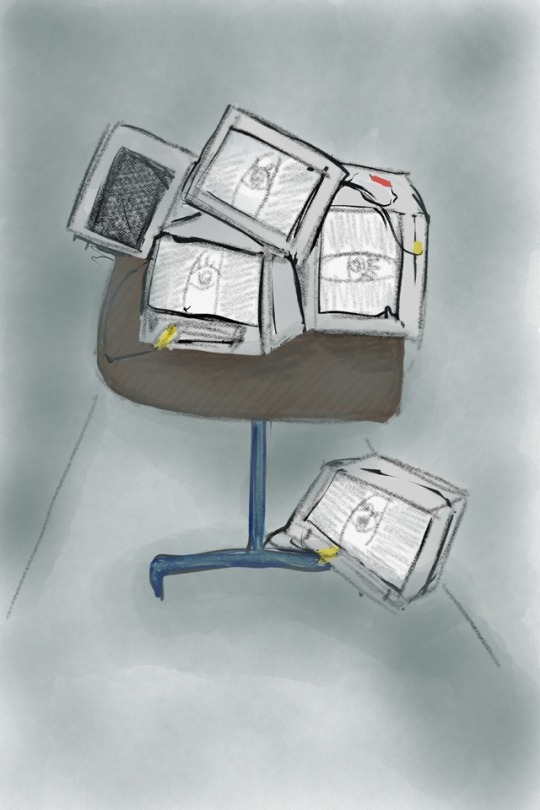
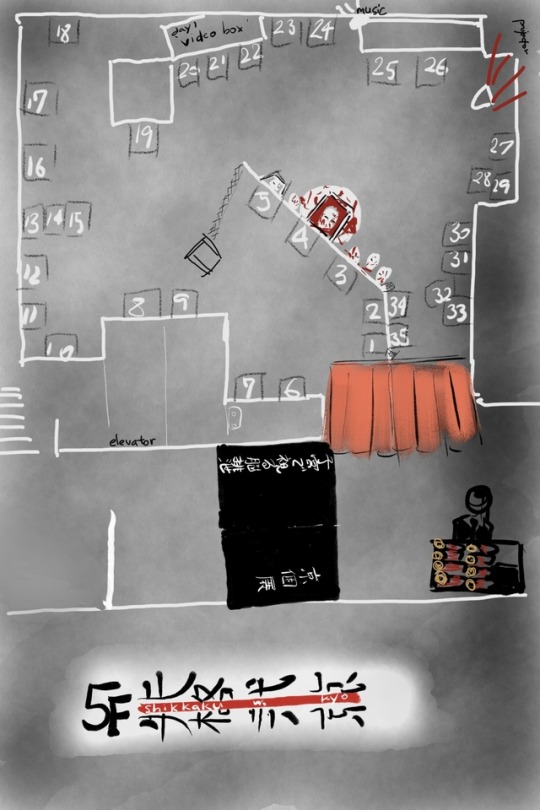

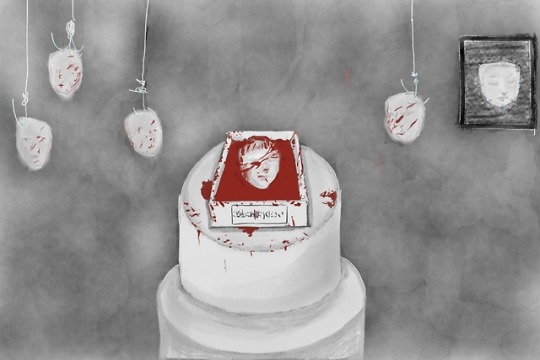


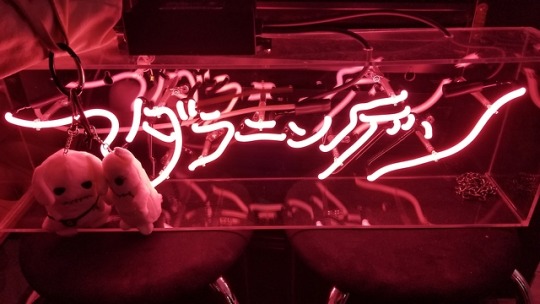
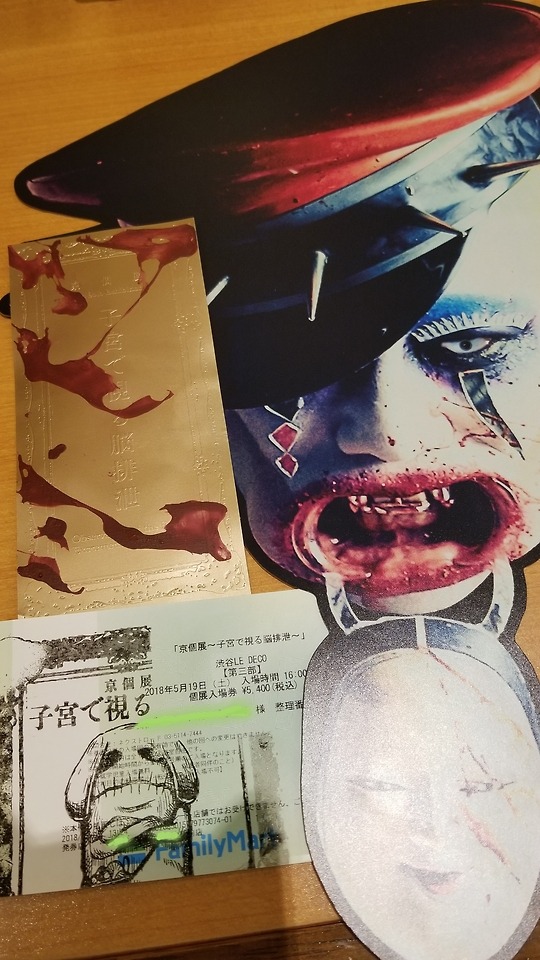
京個展~子宮で視る脳排泄~
kyo’s solo exhibition ~Observation of the brain excretion in the uterus~ 2018.05.09-19 report
The gallery LE DECO is located a few minute walk from Shibuya station so it didn’t take long to get there (only if you use the right exit though 😂). But on the first day we got quite bad weather, so it was a relief when staff let us in. On the side note, kudos to the staff member who had to announce ‘people who came to see [Observing of the brain excretion in the uterus] please line up to use the elevator’ over and over. He definitely made passersby do a double take hearing the event name 😂
The entrance floor - 6F
Once in the building we were told to wait for the start of the time slot. There was a screen with a projector showing the live footage from DIR EN GREY mode of VULGAR tour and sukekiyo, followed by the short interview (it will get a separate post). I actually didn’t notice it at first, but on the second day I went with a friend who is Toshiya’s fan and she pointed out that DIR’s footage was a perfect 'Kyo’s angle’ - the most you could see of other nembers was Toshiya’s or Shinya’s arm 😂 At some shows that’s exactly what I see… sukekiyo’s footage was from Kyo’s birthday show at Mynavi Akasaka BLITZ, I really hope it will be released at some point! I really enjoyed seeing this performance again. *On the 13th dir mode of kisou*On the 15th there was footage from sukekiyo’s 2015 The Unified Field tour instead of DIR’s. *on the 16th there was DIR footage from the mode of TMOAB.*on the 19th VULGAR again (inside joke - and we couldn’t become one).
The stamps for goshuin books were also located on this floor and some people used them when we were waiting (and no one was actually checking if you used a goshuin book or not). There were two designs, Zemeckises one with Hui and Kyo’s picture drawn by Junji Ito.
When it was finally time for the time slot to start staff started to call people one by one. On the first day people were surprised as they didn’t deduct that the 1st slot numbers start from 101, but staff quickly changed the way of calling from number 1 to 101 ;) Over the number 50 they changed to calling by 5s. Upon ticket check we received a small water bottle with a label with a event logo and a silver plastic bag. When checking the bag later I saw it had 'Kyo’s mask’ and a memorial ticket inside. Each mask had a small curse omikuji glued on the back, there were five kinds (collected all to be happily cursed!😍):
◆平等とは平等で非ず・ equality is never truly equal ◆己を決めるのは己のみ・only I decide about myself ◆時間は必ず貴方を良くも悪くも変えてくれる・the time will always change you, be it for better or worse ◆噴き出す感情はそのままで良い、より人間らしく・it’s fine to just let strong feelings out, it’s more human ◆状況を変えられないのではなく変えないだけ・it’s not that one cannot change the situation one just don’t And from this point we used stairs to move between floors.
The Zemeckises floor - 5F
This floor entrance greeted us with a dark red curtain, The Zemeckises sign over it. On the second day they added draped brown curtain with decorative tassels over the plain red one (was it one of the things that didn’t arrive on time? *on the 15th I noticed there were two additional panels! (CHAOS one and 'cute guy’ one)). Inside we could enjoy various panels with what I’m guessing were scenes from the upcoming picture book. It was so lovely to see Hui so much! One of them had Hui-chan standing in front of the bridge leading to a small street, on the buildings and shop signs we could see sukekiyo name and their various songs titles.
It was also nice to see the set of 4 TVs previously used at Madaraningen shops and sukekiyo shows. This time they played three Zemeckises videos in the loop. First one that was used to promote VITIUM (introducing family living in the dark forest), Second was the promotion of PERSUASIO - Mama murders someone, Penyu is being persuaded he should bear darker intentions towards humans and older bro introducing sukekiyo as their footage was on TV Third had all family members saying what they are missing: Big bro: DIR音源がない Raimi: 心がない Mama: sukekiyoのライブがない Baby bro: ダブルチーズバーガーがない Papa: ママのご飯がない Penyu: お菓子がない Penyu held a book and walked through the forest, his whole family following him closely. He ended up on the ground, family jumped on him, there was a light flashing from his eyes and… cliffhanger 😂
I liked here how '3D-ish’ the panels were, for example there was a standing figure of family members in front of the panels creating a scene together. The figure of Mama who was sitting with Raimi even was sat on the chair in pieces so if you looked from the right angle it looked very good! There was also a proper figure of Papa with his eye lit up in red connected to the panel with dressed up Mama (it was in front of the TVs). I don’t want to explain panels too much, Kyo said in the interview that it was hard preparing this floor because the book is not out yet, but some of them were also used as the designs for goods.
The Shikkaku floor - 4F
It was absolutely brilliant ♥♥♥ From the first view - after going through the first black curtain with exhibition name on it, this exhibition entrance was done in the form of red PVC strip seethrough curtain and before entering a staff member handed each of us a torch. Because this floor was quite dark, there was enough light to walk around safely, but to be able to observe photo prints you had to use the torch. There was a white cloth draped from the ceiling, hanging loosely at some places, and there were some metal fixtures that were painted black, but overall the room was kept quite simple; all added to the atmosphere. With the industrial music in the background it created an incredible effect!
Photos were hanged in black wooden frames around the floor. I was really impressed with the time span that photos came from! (*confirmed by yahoo news that it took over 4 years) Shikkaku vol.2 will be a delight for our eyes and hearts. There were so many styles and ideas. The ones that really stood out to me was Kyo sitting in a seated venue (this one was moved to a lower spot on the wall on the second day, I don’t know why), black hat photoshoot and one with his hand on the first plan. And the ones near the dam. And the ones with the eye. And… they are all so good!😂
The really big surprise when going for the first time was noticing the 'faces wall’ that was around the corner. Interesting, morbid, fascinating, meaningful, shocking, so very much Kyo! Silicon casts of Kyo’s face were displayed in two ways. Four of them were hanging on huge hooks. One was pinned in a glass case like a butterfly. But the one that probably caught everyone’s attention the most was a plaster casting that was put in a rectangular dish filled with fake blood. Quite slimy and sticky fake blood. I don’t know if it was deliberate, but as a woman I couldn’t help thinking about the uterus in the exhibition title seeing the consistency and color of the fake blood… The dish had a sign 'ご自由にお触りください / please touch freely’ and. It felt so weird to touch the cast of his face, even more if you touched the blood. In the beginning of the 1st time slot the face was clean, but later people covered it with blood. It was absolutely fascinating to be able to see how it changed through the day - during the last time slot on the second day the silicon face casts on hooks had some bloody streaks as well and there were many 'spills’ around the dish. It was also fascinating to watch people’s reactions - so many didn’t like the slimy texture or got freaked out when discovered it was quite sticky. And compared to the previous exhibition’s box with a casting of the hand hid in slimy balls - there was no staff with wet tissues nearby ;) The 2nd time I visited I went straight for this floor when most people went for goods to have few minutes alone with it :3 *on the 15th I went for the 1st time slot and the fake blood was much more jelly like at first, but as people touched it and it got warmed up it got more sticky. Also the face in the dish of blood was cleaned but it stayed slightly pink in some places. *on the last day (the 19th) it was so jelly like you could take a chunk in your hand, it was still very fun to play with! 😁
There was one more point of interest on that floor. Kind of hidden behind the wall was a tiny tiny room, more of a box that had a short video footage with Kyo from the photobook cover photoshoot. It created quite a line on the first day. But on the second day the video footage was moved from the hidden box and displayed on the wall, the image was quite distorted because of the angle and the uneven wall. My guess is that Kyo wanted to avoid people queuing inside.
The merchandise floor - 3F
I simply followed the person in front of me first time I visited and they went to the goods floor first; it actually turned out to be a good choice as some items got sold out (I got the last black Junji Ito shirt that time), same in the next time slots - as soon as the word that some items are in quite limited quantities got out they started selling out faster. They had 3 tables - from the right - for ordering photobooks, picture books and reprints, for purchasing goods and for using capsule toy machines. I think the 'hottest commodities’ were Junji Ito’s collaboration t-shirt, capsule toys and plushies. And if you spent over 3000 yen (?) on The Zemeckises goods you received a cute clear bag as a present :3 I’m glad I got the goods I wanted at the first try as later I could enjoy the exhibition more freely. On the same floor there was also a huge panel with a photo of Kyo that we were allowed to take photo of (and with, if someone was so inclined ;)).
And an extra: Madaraningen POP UP SHOP - B1F
A nice accent when going down the stairs to the basement was the neon Madaraningen sign waiting for us at the bottom. As we entered there was a projector display and three panels with Kyo wearing various new items on the left. Turning right there were racks with clothes, some tables (with postcards and for placing orders). I only got postcards as I’ve already ordered some stuff after sukekiyo shows. There were two sets - one with 4 postcards (A) and one with 3 postcards plus a random 'kinda-polaroid’ of Kyo (B).
169 notes
·
View notes
Note
I didn't know you read Wild Cards. Can you give us some thoughts on the series?
I actually read Wild Cards long before I read ASOIAF. I’ve talked about it a few times, you can see my tag here. But sure, some thoughts:
Wild Cards got started in the mid-80s when a bunch of SF/F writers in New Mexico got together to play role-playing games. GRRM became the DM for a new game, based on a superhero RPG, and soon all these writers were developing characters and plots and worldbuilding and such. Eventually they realized while they were spending a lot of time working on writing, they weren’t actually making any money… so they decided to actually write up their superhero world as an anthology collection of short stories. This shared-world anthology idea wasn’t invented by them: Thieves’ World had been going (in fantasy) since the late 70s, another series of that type started in 1985, and it was something SF/F agents knew how to sell. Wild Cards also hit the zeitgeist of superhero deconstructionism (Alan Moore’s Watchmen and Frank Miller’s TDKR both came out in 1986), so it was picked up for a three-book contract by Bantam, with the first book (Wild Cards, naturally) published in 1987. GRRM was the editor (and creator/writer of several characters), and they got many other writers to contribute besides the ones in their RPG community, including greats like Roger Zelazny.
The world of Wild Cards is an alternate history where an alien bomb exploded over New York City in 1946, carrying a virus payload. This virus had a certain probability in how it affected people’s DNA, and info from the alien geneticist who’d defected to Earth (trying to stop his colleagues from experimenting on an innocent world) led it to be known as the wild card virus. Of those who were infected by the wild card, 90% died, their bodies wracked with horrible transformations (“drawing the black queen”). Of the survivors, 9 out of 10 lived transformed, usually into monstrous or freakish or just plain ugly creatures (“jokers”). And the rare 1%, the “aces”, still looked human… but gained superpowers. The virus spread across the world over time, infecting countries, changing history… and there are still unknown caches of the virus that can cause an outbreak at any time. Though mostly these days it’s transmitted genetically, from wild cards who have kids (though many avoid doing so because of the 90% chance of black queen and 9% chance of jokerdom), or more often from latents, people who were infected and their DNA changed but who never had the trauma that would set off their transformation. (Other terms: “nats”, natural humans; “deuces”, aces with a fairly lame power; and there’s also the occasional joker-aces, people who look monstrous but also have some kind of superpower.)
Anyway! Enough backstory. I really do enjoy the series. I first picked it up around, hmm, 1990 I think? when I saw one of the books in the SF/F spinning book racks in the library and the cover drew me in. (I was hugely into X-Men at the time.) The library had all the other books available too, so I took ‘em home and was completely caught. It was adult (rather adult, beware triggers), often super dark with its “superheroes in the real world” themes to the point of lol edgy, some of the covers were ehh (though honestly the 2nd edition Bantam covers were not bad, thankfully I never saw the imho godawful UK covers)… but the worldbuilding, the plots, the characters, the writing… everything was just so very good. I fell in love with such characters as:
GRRM’s Tom Tudbury, “The Great and Powerful Turtle”, an overweight bullied nerd from New Jersey with hugely powerful telekinesis, who flies around in a turtle-shaped shell (originally a VW Beetle with armored plating)
Roger Zelazny’s Croyd Crenson, “The Sleeper”, who was a 14-year-old boy on Wild Card Day, came home from school (witnessing all the horrors) and fell asleep… and awoke weeks later, looking like an adult, with powers. Every time he sleeps, he becomes someone different, sometimes a joker, sometimes an ace… and he’s terrified of drawing the black queen, so after a time he’ll do anything to avoid sleep…
Melinda Snodgrass’s Prince Tisianne, “Dr. Tachyon”, the alien geneticist mentioned above, telepathic, exiled to Earth, serving his penance by trying to cure the virus, and all-time winner of the All-Comers Angst Contest (beating out Scott Summers and Tyrion and just about any manpain or real pain hero you can think of)
Victor Milan’s Mark Meadows, “Captain Trips”, a hippie biochemist who takes drugs and turns into other people for an hour. His “friends” include Jumpin’ Jack Flash, pyrokinetic; Aquarius, were-dolphin; Starshine, sun-powered enviromentalist; Moonchild, martial artist; and other alters that he can’t reach and doesn’t know he doesn’t want to. (One of my teenage marysues was one of Mark’s friends, Lucy, an interdimensional teleporter with kaleidoscope eyes.)
Gail Gerstner-Miller’s “Peregrine”, who has feathered wings and can fly (and is technically a joker because of the transformation, which includes hollow bones, but most people think she’s an ace because she’s beautiful), who became a model/actress and then a late-night talk show host, but sometimes fights with claw-gloves, and may be the mother of the messiah
Stephen Leigh’s “The Oddity”, who used to be three people living in a threesome until one morning they awoke merged into a single monstrous shifting being – he/she/they serve as the protector of Jokertown (a neighborhood in Manhattan that’s pretty much a joker ghetto)
GRRM’s Jay Ackroyd, “Popinjay”, a detective who can point at you and teleport you anywhere he can recall (but his powers aren’t why I love him, he’s just so great... actually I think that applies to all of the above but anyway)
And god, the villains: death’s glare Demise; Mackie Messer, who vibrates to phase through walls and tear people apart; the Puppetmaster, manipulative empath and US presidential candidate; Ti Malice, who possesses his “mounts” and makes them do whatever he wants for his pleasure; the Astronomer, cult leader; the Jumpers, a gang of youths who can leap into people’s bodies; Blaise, Dr. Tachyon’s grandson, mind-controlling sociopath… and so many more heroes and villains and regular people trying to do their best despite what the virus has done to them (or even nats, doing the same), I can’t remember but they’re all so good…
But after jumping between publishers, the series pretty much ended in 1995, with the 15th book. (Some weren’t anthologies, some were “mosaic novels” edited into one coherent story, and a few were solo authored.) There was a book in 2002 and another in 2006 (that I haven’t read) when they got a new publisher, but that didn’t work out. But then in 2008, Wild Cards got picked up by Tor, and began a brand new series (with gorgeous covers by Michael Komarck, who’s gone on to do covers for reprints of the original series), with Inside Straight, introducing new aces and jokers in a world of reality shows and social media. I somehow did not manage to pick up any of the new series until recently (I don’t know why, I think maybe some of the very dark and depressing later books burned me out a bit and I was wary?), but my gosh, it’s so fun.
I love GRRM’s Lohengrin (a German nerd who armors himself in light as a modern-day knight), Melinda Snodgrass’s sex-shifting teleporting spy, Stephen Leigh’s Drummer Boy (a six-armed joker-ace who’s used the drums on his chest to become a rock superstar), Caroline Spector’s Bubbles (transforms kinetic energy into body fat, and then fat into kinetic bubbles that can look pretty or hit very hard), and so many more. I really need to get the rest of the new series– I’ve been spoiled for it a bit because I read the Wild Cards short stories Tor has on their site, and I recently read Lowball, the 22nd book that came out in 2015 (and holy shit that ending), but books are expensive and I’ve been reading other things. Still, I need to fill in the gaps and I need to know what happens next, I should be getting the rest of the series. If this sounds interesting to you, you should too. :)
If you have any other questions, just let me know!
32 notes
·
View notes
Photo

Book Blitz: Love in the City


Love in the City: Limited Edition Romantic Comedy Box Set Publication date: February 16th 2021 Genres: Adult, Comedy, Romance
Get ready for thirteen heart pounding and laugh out loud rom-coms from thirteen bestselling and award winning authors, including Amazon chart toppers and USA Today bestsellers. Filled with mystery, second chances, soulmates, brother’s best friends, bad boys, nobility, and the cute guy in the cubicle next to you, these stories will captivate you and leave you wishing for more. Download this limited edition box set while you can and indulge in these sweet and sexy leading men and strong and beautiful heroines while they fall in love in cities around the world. Sariah Wilson – All’s Fair in Love and War Becky Monson -The Love Potion Jennifer Peel – Love the One You’re With Kirsty Greenwood – Love Will Save the Day Whitney Dineen – Love for Sale Aven Ellis – Love, the Viscount, & Me Shari L. Tapscott – Little Lost Love Letter Lucy McConnell – Love: Going Up? Kate O’Keeffe – A Very English Love Story Erin Huss – Love, Lies, and Limo Rides Melissa Baldwin – Thanks for the Love Stephanie Fowers – Love at the Masquerade Kathryn R. Biel – Vision of Love
Goodreads / Amazon / Barnes & Noble / iBooks / Kobo
—
SNEAK PEEKS:
Love For Sale—Whitney Dineen
Even though I don’t devour Hollywood news like a sycophant starlet, I still know who Jonathan Silver is. He’s the head of Ravenswood Films, the movie studio that’s been churning out a crazy-long streak of award-winning films.
“Why does Jonathan Silver want to work with you?” Lucy demands. “And what in the world does he mean by, ‘ready to buy love? ’Are you a madame in disguise?” She sneers the last question in such a way as to suggest that’s the only way someone like Jonathan would choose to work with me.
No one in the office, except for Sky, knows about my talent for matching people to the house that will lead them to true love. It’s not something I advertise and my whole client base comes from word of mouth. One happy customer tells a friend, who tells her sister, and so on. Which leads me to believe that somebody in my Rolodex must know Jonathan Silver.
I smile at Lucy as sincerely as I can before answering, “I have no idea what he meant. I guess I should give him a call and find out.”
The throng around my desk eventually begins to disperse when they realize I’m not going to do that in front of them. The only person who doesn’t leave is my boss, Frederic. The smile on his face radiates nothing short of greed. I assume he’s salivating over the commission we’ll get from whatever house Jonathan buys.
He confirms my suspicions when he says, “Don’t sell him anything under twenty mil. I have four listings right now that you can choose from.”
“Frederic, Jonathan will make up his own mind about which house he wants. I’ll offer to show him your properties, but I can’t guarantee he’ll go for any of them.”
My boss shakes his bald head at me. Frederic looks like a villain from a Masterpiece Theatre show that takes place in Victorian London. He’s short, bald, has a pencil-thin mustache he actually waxes, and his eyes are too close together. If I didn’t know better, I’d think he had a rap sheet a mile long for offenses that include, but aren’t limited to, tying women to train tracks.
“I’m not kidding, Emily. I want you to sell him one of my listings.”
“I’m not kidding either, Frederic. I’ll do my best, but I make no promises.” My boss tolerates my non-deferential attitude, which is good because there’s no way I could fawn all over him like the other girls do. Chris Hemsworth, he’s not.
After Frederic stomps away, Sky scurries over and mouths, “OMG!” Then she leans in and whispers, “Let’s get out of here so we can talk.”
—
Love the One You’re With—Jennifer Peel
“You punched in the wrong code,” I whispered, a bit on edge. I mean, it wasn’t like I was getting ready to sneak into the home of one of the most recognizable women in the country right now. Okay, that was exactly what I was doing.
“Don’t get your panties in a wad, darlin’.” Dallas tried the code again to get into Vivian’s gated community. He had the fanciest car of anyone I knew—a Range Rover. And he was more than willing to help in the heist. Not only was he a troublemaker, but he was willing to do anything in the hope that Jake would move out of his place. I’d warned Dallas this was no guarantee that Jake and I were getting back together. In fact, I hadn’t even told Jake about the video yet. I thought maybe I should get the picture back first and then we should talk face-to-face.
“Don’t fuss at him,” Abs scolded me. “You’ll only make him nervous.”
I rolled my eyes. She was sitting in the front with Dallas, and the two had been flirting nonstop on the drive over here.
Dallas flashed Abs a devilish grin. “I’m excellent under pressure,” he drawled.
Even in the dark, I could see Abs blush. “Is that so? Would you like to prove that to me?”
Oh. My. Hello Kitty. I’d started saying that instead of hell when Maribelle was younger because there was nothing like your six-year-old telling your pastor that he gave a hell of a sermon. “Y’all, we are kind of in the middle of something important here. Can we push pause on the flirtation button?”
“I like the sound of pushing buttons,” Dallas said seductively. “Just tell me where.”
Abs giggled.
I threw up my hands and fell back against the seat. “I can’t deal with you two.”
Dallas turned around and pursed his lips together. “Now, darlin’, don’t go acting like someone licked the red off your candy. I got this under control.” Without looking, he reached out of the car window and punched in the code X had given me. The large wrought iron gate began to swing in, allowing us access to one of the glitziest neighborhoods in Nashville—Forest Hills.
“See, darlin’, I got this.”
I blew out a deep breath. I was glad someone had this under control. I didn’t know why I was doing this. If I wanted to, I could have had the picture reprinted and bought a new frame for Jake. It was just that something about Vivian got under my skin. The way she and the show’s producers manipulated those videos was wrong. They were intentionally hurting people’s lives. The lives I cared most about in the world—Maribelle’s and Jake’s. Even if Jake could be insensitive, I still loved the man. He was my first love, my only love.
—
The Love Potion – Excerpt by Becky Monson
It’s going to be a great day.
I believe this. I’m just having a bad moment. That’s all. One moment will not speak for an entire day.
“What’s that smell?” my coworker Josh asks as soon as he sees me. He’s sitting in his black, ergonomic work chair, leaning back, the cuffs of his pin-striped button-up dress shirt pulling taut as he folds his arms.
My heart is hammering in my head, my face feels flushed—even with the cool Phoenix morning—I’m sweating, my bangs are glued to my forehead with perspiration and my glasses are sliding down my nose. It could be this big chunky sweater I’m wearing. I grabbed it to put over my favorite navy dress with the white polka dots. Not even my favorite clothing item can save me from my current . . . predicament.
But it’s fine. It’s going to be fine. I push my large, blue-framed glasses up my nose—the ones my best friend Hazel calls “nerdy-cute”—and set my shoulders straight. Everything is all right. Good, even.
“Seriously, Ally, what is that?” Josh’s face is now scrunched, his light-brown eyes squinting. His extra thick brown hair styled in what can only be called a modern mullet. It’s tall and sort of unruly in the front, and the back is halfway down his neck, the ends curling just behind his ears. It’s the kind of hair that women would want to run their fingers through. I have, actually—I couldn’t help myself.
Josh Wise—never wrong, always wise. That’s how he introduced himself to me when I first started working with him. We were instant friends and not just the work kind. We spend plenty of nonworking time together, too. He’s part of my inner circle now, one of my favorite people.
“Is it bad?” I ask as I sit down in my chair at our shared workspace, the long, double-wide table where my team sits. I open the bottom drawer of the filing cabinet just under my space, putting my purse inside and shutting it with my red patent leather heel–clad foot. I wrap a hand around my long, dark-brown hair and pull it away from my neck, letting the cool air of the office hit it.
Josh crinkles his nose. “I mean . . . it’s not the worst thing I’ve smelled.” He waves his hand in front of his face, as if to ward off the offensive stink.
GIVEAWAY! a Rafflecopter giveaway
Hosted by:

#Adult, #Bibliophile, #Bookblitz, #BookBlogger, #bookworm, #Comedy, #readersofinsta, #readersofinstagram, #Romance, #RomanticComedy, #RomCom, #XpressoBookTours, #XpressoTours
0 notes
Text
Before Conan the Barbarian, There Was Bran
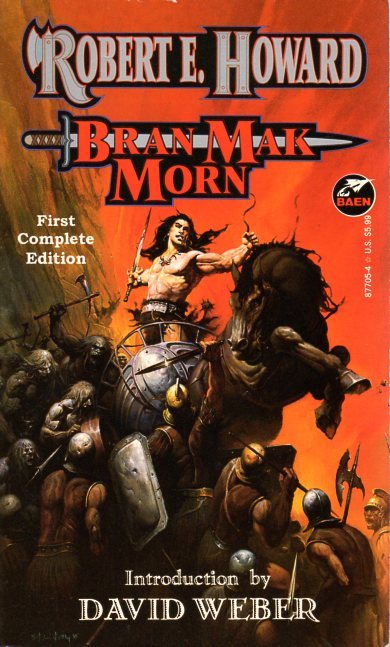
By Adrián Maldonado
I write about medieval barbarians in my legit academic work, and use this blog to explore how they occasionally escape from our powerpoint slides into the public consciousness.
I recently realized that for all my degrees, I didn’t know a thing about one of history’s most famous barbarians. It was high time I looked up Conan.
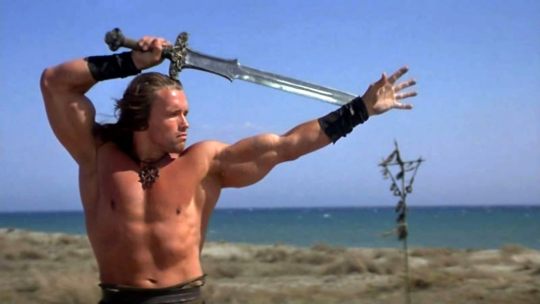
Stock image of Dark Age Europe
In my 80s childhood, Conan the Barbarian was a kind of folk character – a stock image of a beefy white guy in a furry loincloth with a giant sword. (I would probably be picturing Conan the Librarian, to be honest.) But I already had He-Man in my life, a knock-off Conan cartoon made to sell toys, though I could not have known that because the cartoon was so unspeakably awesome it would brook no questioning. Indeed, I only discovered the Schwarzenegger Conan films later on, when I was old enough to realize he had made other weird, non-science fiction films back in the Reagan era. I knew vaguely that the character was based on a book, or was it a comic book? This was before the internet, and before I could ever give a shit about a character with no good action figures.
Flash forward twenty years or so, when I am a grizzled Xennial hunched over his computer, writing about depictions of the Picts in pop culture. Immersed in terrible filmic depictions of ancient Scottish warriors (always warriors), it struck me that I had never thought about Conan the Barbarian. What kind of barbarian was he meant to be? Did his story take place in some kind of historical epoch? Were there Picts in it that I could add to my list?
Imagine my shock when I did find a Pict down this rabbit hole (or souterrain?), and he looked like this:
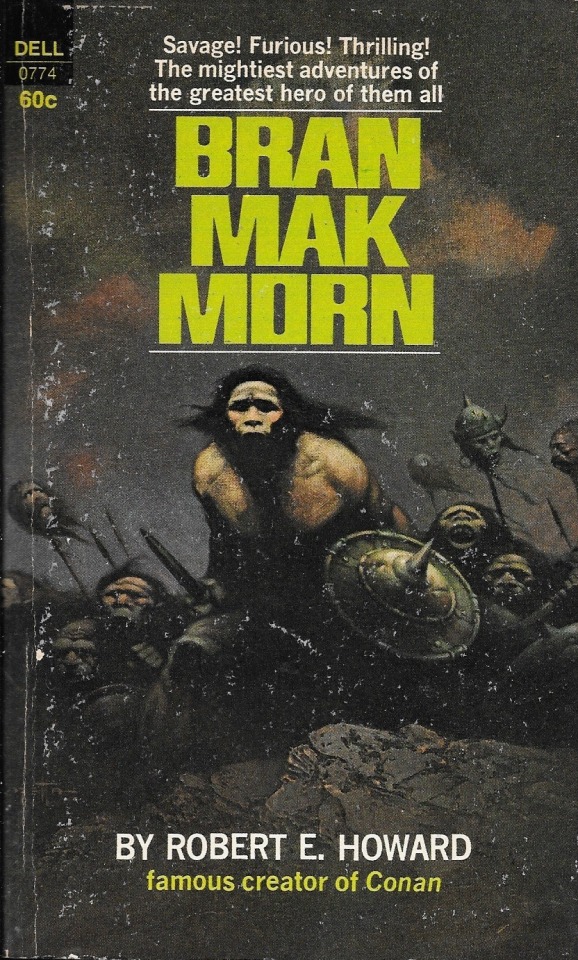
Whatever else I was working on, stopped.
***
Robert E. Howard is best known today as the creator of Conan the Barbarian. But little did I know that he was one of the first pop culture appropriators of the Picts. Indeed, he was writing about the Picts long before he even conceived of Conan. The Picts were his muse. I feel like this is important, and I may need more than one blog post to say why. But first, an introduction.
I had seen some hilarious renderings of Picts over the years, but they always fell into the usual stereotype of tattooed maniacs hurling themselves onto Roman spears.
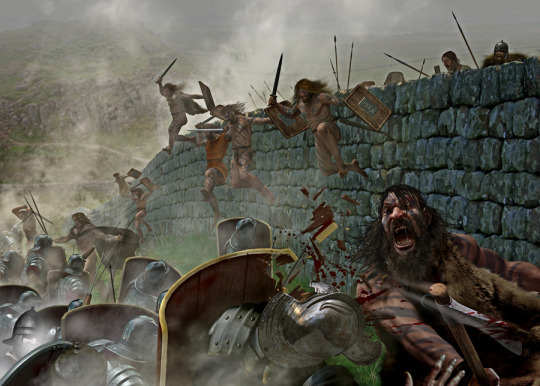
Tattooed maniacs hurling themselves onto Roman spears (source)
This 1960s paperback collection of stories by Howard entitled Bran Mak Morn, apparently the last king of the Picts, depicted this king Pict as a Neanderthal surrounded by howling ape-men. To me, this seemed like the purest distillation of the idea of the barbarians beyond the wall as sub-human, a trope developed in Roman imperial propaganda and continually reproduced today by the Hadrian’s Wall heritage ecosystem.
The paperback was one of a series of reprints of Howard’s genre-defining pulp fantasy of the 1920s and 1930s, brought back to life in the wake of the Tolkien wave of the 60s. Closer inspection revealed that Frank Frazetta’s 1969 cover image bore little resemblance to the description of Bran himself in Howard’s tales, even if his Pictish ‘race’ was certainly of a simian variety. More on this presently. What I wanted to know first was how a Texas kid learned about the Picts in the early 20th century, and came out with this.
***
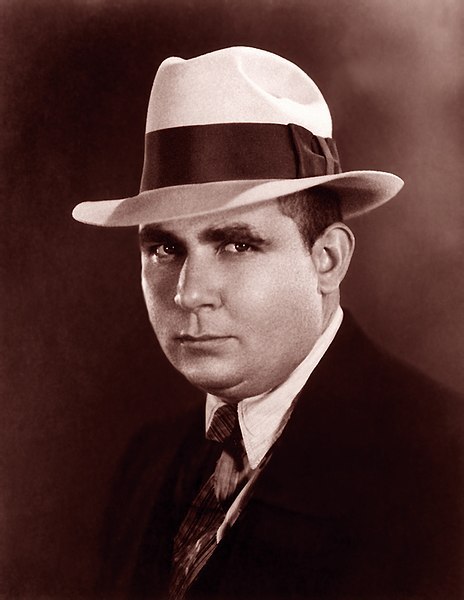
Robert E Howard had a tough childhood in his native Texas. Coming from a broken home, he moved around a lot and read books to keep himself company. In 1919, at the age of 13, his father dragged him to New Orleans while he took classes, so he squirrelled himself away in a library on Canal Street. It was there that he first read about the Picts in a book about British history. The image of a little, dark race from the north that hassled the Romans but could never be conquered fascinated him. Perhaps due to the ray of light this book gave him at a sensitive point in his childhood, the Picts remained ingrained in his mind for the rest of his short life, which he would later take in 1936, at the age of 30.
Like many other nerdy kids, he wrote stories to pass the time. In his archive were found several early writings which reveal the impact the Picts had on him. There is a school paper from 1920-23 about the Picts. The first story he ever submitted for publication was about the Picts, ‘The Lost Race’, but it was rejected by the editor of Weird Tales in 1924. He sold his first story later that year, beginning his professional writing career. A revised version of ‘The Lost Race’ was finally published in Weird Tales in 1927, introducing the world to Bran Mak Morn, a Pictish king who fought the Romans. He would go on to make several more appearances in Howard’s swords-and-sorcery tales, and the Picts eventually became one of the myriad ‘races’ in Howard’s Hyborian Age, a proto-prehistoric shared universe inhabited by Conan the Barbarian.
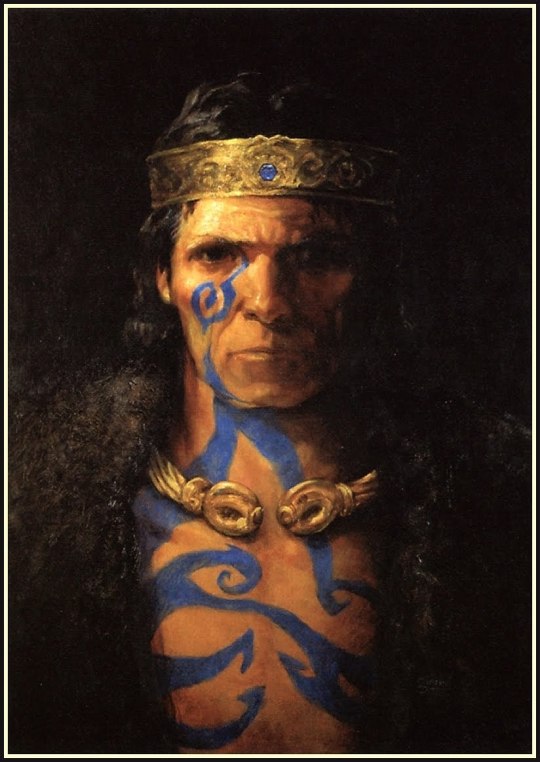
Bran Mak Morn by Gary Gianni (source)
Howard’s Picts are a peculiar bunch. From his first essay on them, he describes them as the remnants of the stone age inhabitants of Britain, comparing their appearance to Native Americans. In this view, they were the ‘Mediterraneans’ (as opposed to Celts or Nordics) who first brought the knowledge of farming to Britain in the Neolithic. They were eventually swept aside by the fair-skinned ‘Celtic’ race of metalworkers, at which point they were forced to mingle and interbreed with the indigenous cavemen, a barely human simian-like race. This meant that by the arrival of the Romans, the Picts had become stunted, swarthy, long-armed ape-men. All except Bran Mak Morn, their king, who had kept his bloodline pure. All pretty disgusting racial logic now, but hey, so the argument goes, it was the 20s.
Except that here it was, unfiltered and raw, in a book released during the height of the civil rights struggle in the United States. I bought this ancient artefact off of Amazon for pennies, and holding it in 2017, it felt like I’d acquired an illicit antiquity. Plenty of writers have tripped over themselves to call out and defend Tolkien and Howard regarding the racial (if not always racist) component to their mythical prehistories, so I won’t go down that route just now. But that cover image haunted me.
***
In 2005, Bran Mak Morn received a brand-new edition, the Weird Tales stories now bundled with unpublished manuscripts, fragments of Howard’s correspondence, and critical essays by Rusty Burke and Patrice Louinet. Armed with an annotated timeline of Howard’s Pictish writings, which spanned his career, and supplemented with google-fu, I was able to clarify the genesis of Bran Mak Morn.
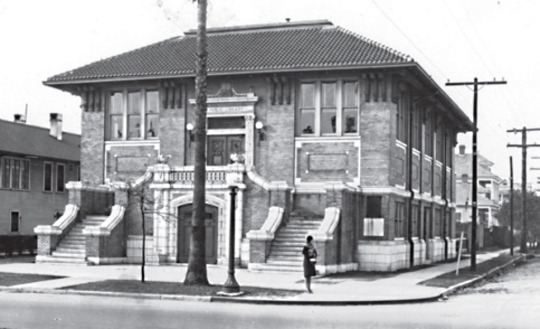
Former Canal Street public library, New Orleans, 1911 (source)
It is possible to trace the public library Howard visited when he was 13, when he first encountered a British history book and his vision of the dark, prehistoric Picts. The Canal Street public library in question must be the one that formerly stood at 2940 Canal Street at the corner of South Gayoso, opened in 1911. A photograph survives on the New Orleans library website, and Google Maps reveals it is now a Yoga studio.
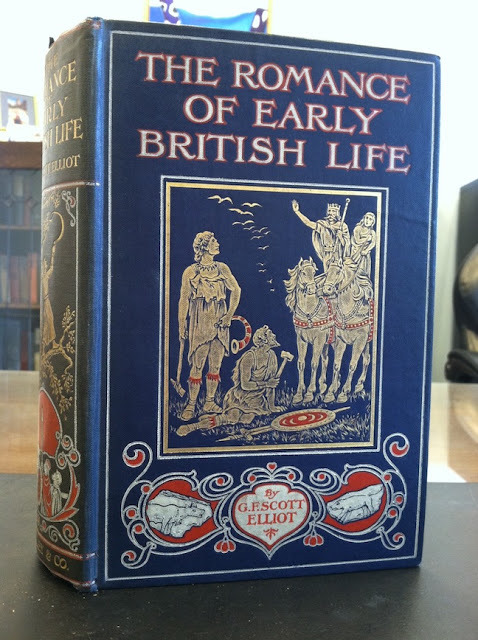
Origin myths of the Picts (source)
Rusty Burke has also plausibly identified the very book that Howard seems to have read: The Romance of Early British Life (1909) by George Francis Scott Elliot. This is apparently one of the flashy, pulpy ‘Library of Romance’ published by London-based Seeley and Co, described as ‘profusely illustrated’ ‘gift books’, which included among their number volumes such as The Romance of Modern Mining and The Romance of the World’s Fisheries. The author Scott Elliot was a botanist and antiquarian, president of Dumfries and Galloway Natural History and Antiquarian Society during an apparent low point in its history.
The fairly ridiculous book in question seems to have been written for Edwardian teenage boys, and does indeed bear the DNA of Howard’s later writing on the Picts: “In very ancient times Britain had been twice conquered, first by the small, dark Picts of the Mediterranean, and later (about 2000 or 1000 B.C.) by the tall, brown-haired, Gaelic-speaking Celts (237).” The chapter on the introduction of farming to Britain is called ‘The coming of the Picts’, in which Scott Elliot explains that they have been called by several names before – Homo Mediterraneus, Basques, Iberians, Silurians, the Firbolg, the Dolmen-builders – but he calls them Picts to save on ink (80-1). He claims they are still readily identifiable in the present day, as the short, brunette people who are mostly found in towns and cities, unlike the fairer Teutons or Kelts who prefer the countryside (92-3).
Howard’s vision of the Picts was thus formulated by the equivalent of our contemporary public archaeology, an accessible potted prehistory of Britain by one of Scotland’s leading antiquaries. Why this particular image, of a dark, forgotten people without a history, resonated so deeply with him, is a subject to ponder. But he was clearly not alone in his fascination. While racial views of the past soon died out in archaeological writing, they would go on to have a tenacious grip on the fantasy world. And which of these two genres do you think has a greater influence on people’s image of the medieval past?
***
Why does any of this matter? It is a demonstration of the role of ‘the Picts’, in various guises, as the untermenschen of what you might call western folk history. The fact that a young boy in inter-war Louisiana could head to the nearest library, read about them in a cheap history book, and then build a world-beating fictional universe that is still beloved today based on this is remarkable. As I’ve spent some time documenting on these pages, that image of the Picts is still in a way with us. A recent article in the Glasgow Herald has the reporter coming to the shocking insight that the Picts were not ‘hairy savages’ after speaking briefly to a couple of scholars. I wonder if that means we are doing our job well, or terribly.
It also opens up questions about the central role of race at the origins of both archaeology and the fantasy genre, a sticky subject that will have to be the subject of future blog posts [Editor's note: now read the follow-up to this post]. In the meantime, go check out similar topics being covered over on The Public Medievalist.
And hey, why not donate to your local public library while you’re at it?
***
Follow us on @AlmostArch
Header image via Jeff Black
5 notes
·
View notes
Text
10 Things You Should Know About Chivas Regal

Sure, in high school terms, “single malt” is the transfer theater kid who also makes the varsity football team — moody, brooding, and unapproachable at first, he’ll win you over and take your lunch money. But that doesn’t make blended Scotch whisky a hyper-approachable, insipidly friendly, “sign-my-yearbook-or-I’ll-scream” airhead.
Witness: Chivas Regal, which debuted Stateside in 1909 as a 25 year-old self-described “luxury” blended Scotch whisky (in a pretty sleek bottle, no less). For over a century in the U.S. market, Chivas has banked on the quality and artistry and finesse of blended whiskies (its roots trace back to 1801, but more on that later). Chivas was so successful in preaching the gospel of blended whisky, it’s now acknowledged to be the apex blended whisky by the brand experts (one even wrote a book about it).
Granted, sales of single malt surged (9.4 percent since 2002), and sales of blended Scotch whisky ever-so-slowly declined (0.6 percent in the same time period). But the market follows trends, not quality. And given possibly lower price points, now might be the time to invest attention — and maybe 30 bucks — in the first blended Scotch that asserted itself as a worthy shelfmate to single-malt Scotch.
Here are 10 things you should know about Chivas Regal.
Yes, it’s blended. That’s not bad.
Let’s get this out of the way: Chivas is a blended Scotch whisky. That’s not bad, or verboten, or icky. Some clarification on Scotch terminology: “Single malt” means malted barley whisky from one distillery, so any Scotch that isn’t labeled “single malt” is blended, meaning made with a mixture of single malt(s) with cheaper grain-based whiskies.
Heresy? Not really. Even as blended sales have dipped since 2002, blended Scotch still makes up 75 percent of the market in the U.S. We love it, largely because it’s lush and reliably consistent.
The Chivas brothers started as grocers. That matters.
John and James Chivas were grocers first, then distillers later, with James as the driving force in the whisky side of the business. This isn’t just a piece of bio history to flash at a cocktail party. The fact that the Chivases (Chivasae?) began as grocers hints at exactly why they became the name behind the world’s first luxury blended (not single-malt) whisky. Think of it from a grocer’s viewpoint: Serving customers daily, chasing after the simultaneous demand for consistency and quality, a blended Scotch makes more sense.
As opposed to finicky, pricier single malts, blended Scotch can be a reliable high-end product, if conceptually down a peg from single-malt snobbery. Think of it like getting a Nitro Cold Brew at Starbucks versus waiting 45 minutes for a coffee yogi to bless your pour-over at Blue Bottle. Both have their selling points.
It’s 100 years younger (or older) than it says.
The Chivas Regal bottle neck says “Established 1801 Aberdeen.” This is true. But Chivas Regal (so called) didn’t launch until 1909. That’s also true. The elements that go into what Chivas Regal is today came at different times: The grocery that became the foundation for the distillery business began in Aberdeen in 1801. The first-ever-christened “Chivas Regal” 25-year-old blended Scotch whisky that launched the brand debuted in 1909. Meaning, yes, the brand can lie about its age (and haven’t we all added or shaved off a century at some point?).
Chivas Regal comes from the most prolific place Scotch is made.
Chivas Regal is produced at Strathisla Distillery in Speyside, the most prolific Scotch-producing region in the country. And while Scotland has been producing Scotch for half a millennium, give or take, Strathisla is still the oldest working distillery in the Highlands, cutting its first batch all the way back in 1786. FYI, Chivas didn’t purchase Strathisla until 1950 — it had been blending with Strathisla’s single malt — but Scotch tourists should be happy they eventually did.
Its distillery is one of the most beautiful in the world.
Any working distillery is beautiful (it produces Scotch whisky, ‘nuf said). And Ron Swanson does his whisky tourism single-mindedly. But Strathisla Distillery repeatedly shows up on “Most Beautiful Distillery” lists, and with good reason. There’s something about the squat, cottage-like stone structure with its sloping cupola roofs that makes it look like a Hogwarts-meets-Hobbiton dreamland (plus Scotch).
Chivas Regal is like Benjamin Button.
The Chivas brothers got their start in the mid-19th century, but “Chivas Regal,” the first-ever luxury whisky brand, was born in 1909 as the brainchild of Chivas master blenders Charles Howard and Alexander Smith. Its American debut was a smash, but Prohibition put an end to all our whisky-fueled Charleston-ing until 1938, when Chivas Regal came back, half as old, the 12-year baseline expression available today.
Chivas 18-Year is likely the better investment.
Chivas 12-year is reliably smooth and delicately sweet, laced with Speyside elements like chewy fruit and even hints of papery nutshell, but two-note grain whisky can singe a bit too hot. Things tend to get more interesting, and closer to Chivas’s O.G. luxury vibe, with the 18-year expression, the personal creation of Chivas modern-era master blender Colin Scott.
Granted, prices just about double for this bottle, from the $30 range to the $70 range, but if you’re looking to convince anyone of the seductive prowess of a well-curated blend, it’s worth the splurge (think fruit, feathery spice, toffee, dried citrus peel, etc.).
Chivas Regal turned its blends into art. 3D DNA portraits, to be exact.
Another reason to sip and serve the 18-Year is that you can chuck out this intel: Looking to create harmony or just confuse everyone, in 2016 Chivas debuted Chivas ULTIS, a “Blended Malt”— a blend, yes, but a blend of single malts from five different distilleries (though technically it’s really a vatting and not a blending when it’s combining single malts only).
To honor the accomplishment, Chivas partnered with a company that specializes, among other things, in turning DNA molecules into — what else? — 3D art, creating five distinct digital DNA “portraits” for the five master blenders from the five distilleries that contributed to ULTIS. The result is this, which is uniquely fascinating and definitely makes us want to drink more. (If you want to try to make sense of it, then pass out, here you go.)
It released the first mizunara oak-aged Scotch in the States.
Chivas doesn’t shy away from the precious or persnickety (see aforementioned DNA 3D art). Case in point: In 2019, Chivas released the first mizunara-aged blended Scotch in the States, meaning a portion of what’s in the bottle has aged in mizunara oak, a combination of two Asian oak trees that’s highly porous and prone to more barrel interaction. Reviews are generally positive, noting flavors like sweetness and soft flora, wood, vanilla, spiciness, toffee, tropical fruit notes, and “delicious complexity.” Yum. Also stealing that for Tinder profile.
Hunter S. Thompson drank it for breakfast.
According to this Associated Press article reprint of a Thompson biography, our very own (and much-mourned) manic scribe started his day with Chivas at 3 p.m., did some, er, other stuff, then hit up Chivas again at 3:50. Bear in mind, this is Hunter S. Thompson, so “breakfast” is a relative term. In any case, Thompson proved even a “luxury” whisky could be responsibly incorporated into a working journalist’s daily routine.
Those who don’t read the abominable — possibly apocryphal — daily consumption diary carefully might miss the “three or four jiggers of Chivas” lashed over shredded ice as the finale to Thompson’s bacchanalian lunch, for digestion and/or final damnation. P.S.: Do not try this at home. He wasn’t an entirely happy guy.
The article 10 Things You Should Know About Chivas Regal appeared first on VinePair.
Via https://vinepair.com/articles/chivas-regal-blended-scotch-guide/
source https://vinology1.weebly.com/blog/10-things-you-should-know-about-chivas-regal
0 notes
Text
10 Things You Should Know About Chivas Regal

Sure, in high school terms, “single malt” is the transfer theater kid who also makes the varsity football team — moody, brooding, and unapproachable at first, he’ll win you over and take your lunch money. But that doesn’t make blended Scotch whisky a hyper-approachable, insipidly friendly, “sign-my-yearbook-or-I’ll-scream” airhead.
Witness: Chivas Regal, which debuted Stateside in 1909 as a 25 year-old self-described “luxury” blended Scotch whisky (in a pretty sleek bottle, no less). For over a century in the U.S. market, Chivas has banked on the quality and artistry and finesse of blended whiskies (its roots trace back to 1801, but more on that later). Chivas was so successful in preaching the gospel of blended whisky, it’s now acknowledged to be the apex blended whisky by the brand experts (one even wrote a book about it).
Granted, sales of single malt surged (9.4 percent since 2002), and sales of blended Scotch whisky ever-so-slowly declined (0.6 percent in the same time period). But the market follows trends, not quality. And given possibly lower price points, now might be the time to invest attention — and maybe 30 bucks — in the first blended Scotch that asserted itself as a worthy shelfmate to single-malt Scotch.
Here are 10 things you should know about Chivas Regal.
Yes, it’s blended. That’s not bad.
Let’s get this out of the way: Chivas is a blended Scotch whisky. That’s not bad, or verboten, or icky. Some clarification on Scotch terminology: “Single malt” means malted barley whisky from one distillery, so any Scotch that isn’t labeled “single malt” is blended, meaning made with a mixture of single malt(s) with cheaper grain-based whiskies.
Heresy? Not really. Even as blended sales have dipped since 2002, blended Scotch still makes up 75 percent of the market in the U.S. We love it, largely because it’s lush and reliably consistent.
The Chivas brothers started as grocers. That matters.
John and James Chivas were grocers first, then distillers later, with James as the driving force in the whisky side of the business. This isn’t just a piece of bio history to flash at a cocktail party. The fact that the Chivases (Chivasae?) began as grocers hints at exactly why they became the name behind the world’s first luxury blended (not single-malt) whisky. Think of it from a grocer’s viewpoint: Serving customers daily, chasing after the simultaneous demand for consistency and quality, a blended Scotch makes more sense.
As opposed to finicky, pricier single malts, blended Scotch can be a reliable high-end product, if conceptually down a peg from single-malt snobbery. Think of it like getting a Nitro Cold Brew at Starbucks versus waiting 45 minutes for a coffee yogi to bless your pour-over at Blue Bottle. Both have their selling points.
It’s 100 years younger (or older) than it says.
The Chivas Regal bottle neck says “Established 1801 Aberdeen.” This is true. But Chivas Regal (so called) didn’t launch until 1909. That’s also true. The elements that go into what Chivas Regal is today came at different times: The grocery that became the foundation for the distillery business began in Aberdeen in 1801. The first-ever-christened “Chivas Regal” 25-year-old blended Scotch whisky that launched the brand debuted in 1909. Meaning, yes, the brand can lie about its age (and haven’t we all added or shaved off a century at some point?).
Chivas Regal comes from the most prolific place Scotch is made.
Chivas Regal is produced at Strathisla Distillery in Speyside, the most prolific Scotch-producing region in the country. And while Scotland has been producing Scotch for half a millennium, give or take, Strathisla is still the oldest working distillery in the Highlands, cutting its first batch all the way back in 1786. FYI, Chivas didn’t purchase Strathisla until 1950 — it had been blending with Strathisla’s single malt — but Scotch tourists should be happy they eventually did.
Its distillery is one of the most beautiful in the world.
Any working distillery is beautiful (it produces Scotch whisky, ‘nuf said). And Ron Swanson does his whisky tourism single-mindedly. But Strathisla Distillery repeatedly shows up on “Most Beautiful Distillery” lists, and with good reason. There’s something about the squat, cottage-like stone structure with its sloping cupola roofs that makes it look like a Hogwarts-meets-Hobbiton dreamland (plus Scotch).
Chivas Regal is like Benjamin Button.
The Chivas brothers got their start in the mid-19th century, but “Chivas Regal,” the first-ever luxury whisky brand, was born in 1909 as the brainchild of Chivas master blenders Charles Howard and Alexander Smith. Its American debut was a smash, but Prohibition put an end to all our whisky-fueled Charleston-ing until 1938, when Chivas Regal came back, half as old, the 12-year baseline expression available today.
Chivas 18-Year is likely the better investment.
Chivas 12-year is reliably smooth and delicately sweet, laced with Speyside elements like chewy fruit and even hints of papery nutshell, but two-note grain whisky can singe a bit too hot. Things tend to get more interesting, and closer to Chivas’s O.G. luxury vibe, with the 18-year expression, the personal creation of Chivas modern-era master blender Colin Scott.
Granted, prices just about double for this bottle, from the $30 range to the $70 range, but if you’re looking to convince anyone of the seductive prowess of a well-curated blend, it’s worth the splurge (think fruit, feathery spice, toffee, dried citrus peel, etc.).
Chivas Regal turned its blends into art. 3D DNA portraits, to be exact.
Another reason to sip and serve the 18-Year is that you can chuck out this intel: Looking to create harmony or just confuse everyone, in 2016 Chivas debuted Chivas ULTIS, a “Blended Malt”— a blend, yes, but a blend of single malts from five different distilleries (though technically it’s really a vatting and not a blending when it’s combining single malts only).
To honor the accomplishment, Chivas partnered with a company that specializes, among other things, in turning DNA molecules into — what else? — 3D art, creating five distinct digital DNA “portraits” for the five master blenders from the five distilleries that contributed to ULTIS. The result is this, which is uniquely fascinating and definitely makes us want to drink more. (If you want to try to make sense of it, then pass out, here you go.)
It released the first mizunara oak-aged Scotch in the States.
Chivas doesn’t shy away from the precious or persnickety (see aforementioned DNA 3D art). Case in point: In 2019, Chivas released the first mizunara-aged blended Scotch in the States, meaning a portion of what’s in the bottle has aged in mizunara oak, a combination of two Asian oak trees that’s highly porous and prone to more barrel interaction. Reviews are generally positive, noting flavors like sweetness and soft flora, wood, vanilla, spiciness, toffee, tropical fruit notes, and “delicious complexity.” Yum. Also stealing that for Tinder profile.
Hunter S. Thompson drank it for breakfast.
According to this Associated Press article reprint of a Thompson biography, our very own (and much-mourned) manic scribe started his day with Chivas at 3 p.m., did some, er, other stuff, then hit up Chivas again at 3:50. Bear in mind, this is Hunter S. Thompson, so “breakfast” is a relative term. In any case, Thompson proved even a “luxury” whisky could be responsibly incorporated into a working journalist’s daily routine.
Those who don’t read the abominable — possibly apocryphal — daily consumption diary carefully might miss the “three or four jiggers of Chivas” lashed over shredded ice as the finale to Thompson’s bacchanalian lunch, for digestion and/or final damnation. P.S.: Do not try this at home. He wasn’t an entirely happy guy.
The article 10 Things You Should Know About Chivas Regal appeared first on VinePair.
source https://vinepair.com/articles/chivas-regal-blended-scotch-guide/
0 notes
Text
Len Wein - Soldier of Victory
This evening my wife, author Shannon Muir, and I will be attending the 2017 Animation Writers Caucus Annual Meeting and Award Presentation at the offices of the Writers Guild of America in Los Angeles. Events like these have always been special to us because at first it was a chance to meet our creative and literary heroes we have looked up to, then becoming fellow animation writers, and in some special cases becoming close friends.
At these annual meetings we honor a writer who has truly added to the animation industry as a writer and creator. This year our presentation must also be a memorial as the award is being given posthumously to writer extraordinaire and friend Len Wein.The outside world knows him best as the creator of Wolverine and Swamp Thing, but he is so much more especially to a little boy who had to sit for hours in a hospital lobby while his grandparents were being taken care of upstairs.
The hospital chaplain took pity on the little boy who had nothing to do on those old vinyl couches than his homework and so gave me two comic books, Superman and The Flash. They were great, and that gift meant a lot to me, but it wasn't until I wandered into the hospital gift shop that my life was changed forever.

Along side the magazines the small shop had a few very small comic books for sell. One of which, with the JUSTICE LEAGE OF AMERICA logo on the top and text at the bottom that read "33 Super-Stars in One Epic Adventure!" with dozens of those heroes jumping of the front and back cover, had my full attention. I convinced my mother to give me the 95 cents to purchase this copy of DC Special Blue Ribbon Digest #11.
Opening those four-color pages I found myself tumbling into a wonderful world of super heroes. Yes, I knew of Superman, Batman, and Wonder Woman from television and cartoons, but there were so many many more. Here I learned not only about the Justice League but also the Justice Society of America, and that there was an Infinite number of parallel earths where more heroes resided.
I was definitely hooked and the DC Universe was my playground from then on.
This digest turned out to be a reprint of JUSTICE LEAGE OF AMERICA #100, 101, and 102, about our heroes on a quest to find seven more heroes lost to the ages.

This great story, that put a boy on a quest to discover all the heroes of the golden age of comics, was written by the great comic book author Len Wein. I would soon be reading many more.
(An interested side note is that Len also edited the Blue Ribbon Digest that it was reprinted in.)
I was not the only one influenced by this comic; fellow comic book writer Gail Simone also marks this story as what began her path into comics.
I learned just the other day that Len himself fell in love with comics as a child while he was in the hospital as well. Though for him it was for medical treatment, but he has stated that those comics and super heroes got him through it.
Now that little boy who sat quietly in the hospital lobby wants to pay his respect to the man who sent towards a career as a comic book and animation writer. I honor you Len for all the stories you have brought to the world, and for being a friend.
Thank you.
Kevin Paul Shaw BrodenFour Names of Professional Creativity
#Len Wein#Animation Writer#Comic Book Writer#Comic Book Editor#2017 Animation Writers Caucus Annual Meeting and Award Presentation#Animation Writers Caucus#Writers Guild of America#AWC#WGA#Justice League of America 100#Justice League of America#DC Special Blue Ribbon Digest 11#DC Special Blue Ribbon Digest#Blue Ribbon Digest#DC Comics#DC Universe#super heroes#Superman#TheFlash#Batman#Wonder Woman#JLA#JSA#Justice Society of America#Justice League#Justice Society#Gail Simone#Wolverine#Swamp Thing#Seven Soldiers of Victory
1 note
·
View note
Text
Pick of the Week and Comics Reviews for the Week of 4/26/17
By Vincent Faust
This was originally published on the date in the title derp
It’s new comics day, everyone! For those totally unaware, the majority of comics come out in a serial format. A single comic is usually called an issue, though there are other weird nicknames like singles, floppies, etc. Major publishers put out their several series once a month. Though the different series are spread out so that product is coming out every week. Special issues called annuals even come out to cover that “13th month” of uneven weeks.
Today I will be reviewing some of the major releases of this week. After reading and reviewing all of them, I will also select a “pick of the week” as the standout issue. At the end I will also make some recommendations about new collected editions that have come out this week.
Pick of the Week: Flash 21 Writer: Josh Williamson, Artist: Howard Porter
5/5
This is how you do a fantastic comic book. Rebirth, baby, let’s go! The DC Universe that everyone knows and loves is on its way back to us. There are so many things to discuss here and I also don’t want to spoil much.
Howard Porter’s art is gorgeous. His representation of Barry’s super speed is gorgeous, though we already know that from his run on the title with Geoff Johns over 10 years ago. We also get a shot of the gruesome corpse of Eobard Thawne, the Reverse Flash. A bruised and bandaged Bruce Wayne also highlights Porter’s versatility. He also admirably handles some flashback peeks in a time travel sequence.

A Watchtower “lost and found” scene shows off so many Easter eggs. What to think of some of these? Meaningless background art or a hint at what is to come? These are clearly the costumes of Hourman, Star-Spangled Kid, and Doctor Midnite. A Rocket Red #7 suit is also seen, which specifically refers back to the 1980s JLI iteration of the character. As opposed to the Generation Lost/New 52 version. The issue also opens with another Johnny Thunder scene.
The final page reveal is insane. Reading this issue makes me realize how much I love these darn characters and how giddy I am that DC is finally taking steps after seven years to make things right again. Perfect.

Action Comics 978 Writer: Dan Jurgens, Artist: Carlo Barberi
5/5
This is continuing Dan Jurgens’ aftermath story following the Reborn crossover saga. Clark is checking through Fortress of Solitude memories to determine what all has changed in his past thanks to the merging with the Superman of Earth-Prime. He basically has phantom memories. This allows Jurgens to do some refreshing on the origin and clarify what is in continuity and what isn’t.
Readers get a jaw dropping splash on page 6 showcasing many of his villains and eras. Electric Blue Superman is notably shown. Darkseid is drawn in his Jack Kirby style. Manchester Black is even here (obviously specifically nodding to What’s So Funny About Truth, Justice, and the American Way from Action Comics #775). We even get to see the trunks on for a second.
Jurgens basically runs us through the major emotional moments of his original 1990s tenure on the Superman books. From his proposal to Lois, revealing his secret identity, to his death at the hands of Doomsday, to the marriage.
The book ends with Mr. Oz teasing something for Clark and Hank Henshaw forming his Superman Revenge Squad with Eradicator, Metallo, Blanque, and soon to be Mongul.
The Superman books are going through a really exciting period right now. Just like many of DC’s characters. But Supes is at his best he’s been for probably a decade. Truly magical work.
Blue Beetle 8 Writer: Keith Giffen and J.M. DeMatteis, Artist: Scott Kollins
3/5
This has been the lowest selling Rebirth title from its debut to its most recent issue. It’s really a shame that it isn’t clicking with readers considering the all-star classic creative team. Though maybe it’s precisely that traditional feel that is holding the book back.
One thing the old school style has going for it is a meaty feeling. I don’t get the same feeling reading this issue that I did from the X-Men books. Not much decompression here. Lots of dialogue and action is packed into this little package.
The title page describes “the reunion of one of the greatest teams in comic book history.” I got really excited and thought it was going to be the return of Booster Gold. But it was referring to DeMatteis joining the creative team as scripter. I haven’t read enough of the previous issues to determine if this marks an improvement.
The final page of Jaime Reyes putting on Ted’s classic Blue Beetle suit is giving me more of those great Rebirth feelings. Check out my post on Rebirth dream books to hear what I think could save this book (it’s Booster Gold).
Justice League of America 5 Writer: Steve Orlando, Artist: Andy MacDonald
2/5
Nothing offensive about this issue. Nothing to write home about either. I still don’t totally understand why this specific lineup has been assembled as the splinter Justice League team. Seems like they’d be better off called the Outsiders. Ryan Choi gets so little attention. As do pretty much everyone on this team. Characterization is completely lacking. As a Philadelphian, I was annoyed that Ray’s home city was teased but the change was not actually acknowledged. Not much else to say about this book. Doesn’t pique my interest much.
Suicide Squad 16 Writer: Rob Williams, Artist: Tony S. Daniel
2/5
First of all, I have not read most of this series. I admit complete bias before cracking this issue open. I don’t think the Suicide Squad has been interesting since John Ostrander left it in 1992. There have been worthy successors like Gail Simone’s Secret Six and Greg Rucka’s Checkmate as far as DC Universe political intrigue and bad guys turned sorta good stories go.
I also think that DC completely ruined the franchise with the New 52. Presenting the book as a core flagship and making Harley Quinn a featured character deflates all of the tension and entire premise of the book. DC considers Harley their “fourth pillar” after Batman, Superman, and Wonder Woman. So the entire point of the Suicide Squad – that a member could die at any minute – is made moot.
DC tapped Jim Lee to initially draw the Rebirth iteration of Suicide Squad. Which obviously indicates they see it as a blockbuster title. Which makes sense from a business perspective given the recent (crappy) film adaptation. But Lee is not a good fit for this title. I also think he tries to return to something close to his 1990s X-Men/Wildcats aesthetic when on major books nowadays. Something has happened and that style of his has been rough on everything since All-Star Batman and Robin.
Enough rambling and onto the actual book at hand. Right off the bat on the cover I spy atrocious costumes for Harley and Deadshot. Katana has some obnoxious TnA perspective going on. On the interiors, Tony Daniel is at least a step up from the misplaced Lee.
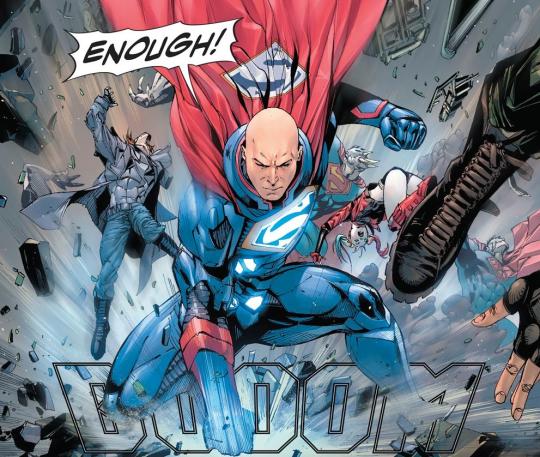
The most interesting character here is Lex Luthor in his new status quo. The Squad infiltrate his complex while Amanda Waller talks him up. All to receive some Kryptonite so that General Zod can join the Squad. Because that is sure to work out.
X-Men Blue 2 Writer: Cullen Bunn, Artist: Jorge Molina
3/5
I still don’t care about these versions of the Original Five. Across Bendis and Hopeless, I was never given a reason to care about this time-displaced Wonder Bread. They’re just boring versions of their older selves. Which of course makes me upset seeing as how Cyclops is my favorite Marvel superhero.
Bunn was clearly born to write Magneto. He’s done fantastic work with the character previously in the Marvel Now era solo series and then in the All-New All-Different Uncanny X-Men. I just wish that he was more of a central character in this book. Jean goes into his mind and Bunn effectively pulls the heartstrings with a Holocaust flashback that was not done in an exploitative way.
Some of the dialogue between the teenagers is iffy. I am not a fan of Jorge Molina’s Jean Grey design. Otherwise, this book felt pretty decompressed. Nothing actually happens, there is no complete story within these pages.
A beginning flashback scene has Jean Grey arguing with Magneto over cooperating. She states that he had battled them over and over again, with his response being “that was a long time ago.” It was for most readers as well. Which is why we don’t care about these characters. But maybe there is a silver lining, with a tasty final page tease.
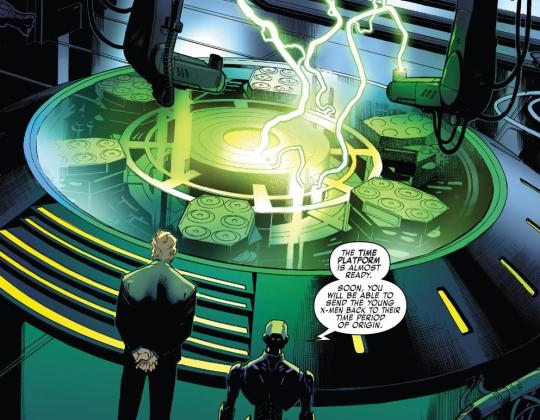
Though this will likely just turn Magneto into a stock villain again. Here’s hoping Bunn has interesting plans.
X-Men Gold 2 Writer: Marc Guggenheim, Artist: Ardian Syaf
3/5
I’m not going to get too into the Ardian Syaf controversy here. His art is meh in this issue, with some bright spots and some sequences that look really lazy.
We an incredibly abridged fight with the new Brotherhood of Evil Mutants. Who we learn are joined by Mesmero. Kitty has an awkward exposition scene with Steve Rogers. Are other books not addressing his H.Y.D.R.A. stuff at all yet?
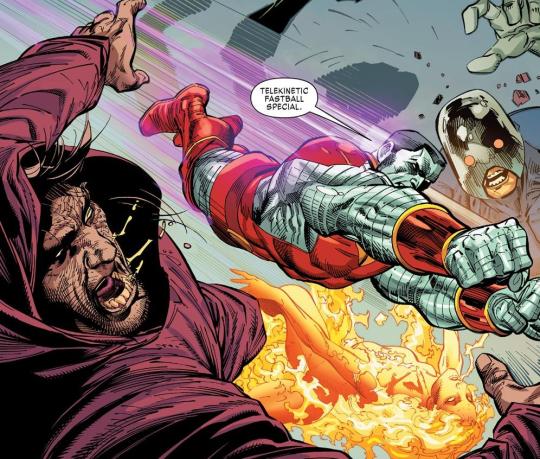
Nightcrawler gets injured, Old Man Logan gets captured. A generic faceless mutant gets shot. Guggenheim is already going overboard with the race metaphor. The new Avalanche and Pyro aren’t explained yet either.
This Brotherhood arc doesn’t have me jazzed to keep reading. It offers nothing new but is also not effectively pulling at my nostalgia for X-eras past.
Reprints
Marvel has a publishing initiative that they call True Believers. It reprints certain classic single issues for a dollar cover price. There are two really cool ones out this week.
One is True Believers: Generation X which collects the debut issue of that titular 1990s X-title. Everyone likes to dig on the 90s era in comics, and especially the X-Men. However, Scott Lobdell and Chris Bachalo did some wonderful work on this underrated title. Bachalo’s art is on a whole other level of innovative and unique. The characterization of these young mutants under the pen (or rather keyboard) of Lobdell was unparalleled for years. This is obviously being released to coincide with the upcoming Generation X series with limited connections to the originals. I am hoping that this new book does well and motivates someone at Marvel to give fans a comprehensive reprint of this classic.
Another is being labeled as True Believers: X-Men Gold. There actually was previously an X-Men Gold book prior to the ongoing one. It was a one-shot released in late 2013. However, this is not that. This reprints Uncanny X-Men #281. Which is the first issue of the next major status quo after Chris Claremont left the X-Men. This is the origins of the Blue and Gold era which the current X-books are trying to recapture. Beautiful (though very 90s) art by Whilce Portacio. A little less impressive script by some concoction of Jim Lee, John Byrne, and Whilce Portacio. This is before Scott Lobdell came on to give an actual direction to Uncanny X-Men.
Avengers: Masters of Evil Epic Collection
This is the third epic collection of Silver Age Avengers from Marvel. It collects issues 41-56, Annual 1-2. The beginning of this is the tail end of the Kooky Quartet era of Avengers history (though at this point joined by Hank Pym as Goliath). This period then proceeds with classic Avengers like Hercules and Black Panther jumping on. Roy Thomas picked up writing the book in the last epic at #35. He will do lots of character development for Black Panther across his run. This ends right before the debut of Vision. One can actually buy four Avengers epic collections from the very beginning. That’s almost 2,000 pages of classic Marvel action.
Flash by Waid Vol 2
The greatest Flash run of all time. In fact, this specific collection collects The Return of Barry Allen. Which is almost universally considered the best Flash story of all time. A Flash fan would have to be insane to not instantly be on the lookout for this.
Saga Deluxe Vol 2
Everyone loves Saga. I think? Brian K. Vaughan and Fiona Staples’ smash hit Image title wows most who read it. With its emotional drama and wacky characters. What is there not to love? If you don’t already rabidly pick it up in issues or paperbacks, here’s a sexy hardcover. Or just upgrade. This collects issues 19-36. Which is equivalent to the fourth through sixth trades.
Young Justice Vol 1
Do you like the animated TV show of the same name? With characters like Connor Kent, Tim Drake, Bart Allen, and Cassie Sandsmark. This is the origin of that title and much of its roster of teenage superpowered heroes. This is also a comic written by Peter David. Which means, as long as DC continues printing them, you will have a solid chunk to read and digest. It also means that the characterization and relationships are on point. I’ve been looking forward to checking this out.
Let me know in the comments below what comics you enjoyed this week or intend to pick up.
#blog#Vincent Faust#comics#comics criticism#comics review#the button#dc rebirth#rebirth#blue beetle#flash#batman
2 notes
·
View notes
Text
Comic Con
Want to purchase X-Males t-shirts online? Whether you have got a love for The Avengers, Fantastic 4, Thor, or X-Males there are lots or t-shirts and other merchandise to own. My childhood included a love for 60s and 70s Marvel and DC comics, and my capability to attract originates in part from learning the tales I read in those days. We labored for a 12 months together on the piece to plan and draw it. Toy corporations like Hasbro and Kenner used to supply thousands of Batman motion determine than is launched every year with some variation in it. Transformers 2, the science-fiction film is the newest sensation, and is the most awaited film of the 12 months. Let's take the movie Avatar for instance. Once in a while I went back to the game to take a number of more screenshots to increase a plot. Inside a couple of minutes, I began making comedian strips. Not like his different comedian strips, in Battling Boy, the hero is a kid, who is on a mission to save town.
In reality, the opposite collection of battling boy turned fashionable. To conclude on this matter, I think it is a fantastic idea to present our youngsters the funny comics created means-again-when, comics out of your and my childhood. To learn a story in adventurous manner is sort of exciting for all the youngsters. You have to overcome the restrictions of speech bubbles and the problem of telling a narrative body by frame. Admit it you've gotten! I’m positive you have heard this standard online retailer. Since Children's Graphic Novels are actually simply an previous thought with a fancy new name, why shouldn't you discover taking outdated successful comicbook concepts and reinventing them for a new generation? The thought was to convey the identical meaning with words that I instructed through colors, textures and images. Popular On-line Comics solidify a which means of a word as a result of footage assist that means to phrases. The nomination was a serious achievement for an artist who had - quite literally -started out small, drawing Post-it word sized comics and hiding them in different people’s work in bookshops. The primary comedian strips appeared in Germany in 1865. It was about two boys who are getting punished for at all times stepping into mischief.
Moreover, if we are sincere with ourselves, we know that a lot of mischief is downright humorous. Why are previous coins worth more than in the present day's coins? Complete collections will fetch too much greater than random particular person comics. Our intention is to give our readers a good piece of entertaining and educational comics on which is able to grow up not one among the future generations. These blockbuster motion pictures performs a very important function in the comeback of comics. Individuals who wish to cherish their childhood memories with the comics; they will easily find cheap comics to start out their comic assortment. In at the present time of "I need the most recent and latest," we really discover that a few of the real treasures are things of previous. Comic books are detailed stories. Aside from conventions, yard gross sales and used guide shops may also be extraordinarily value effective sources for collectible comic books. A comic ebook adaption as well as a novel publication is being performed for the film's promotion. That assumption is incorrect and is an insult to your entire comic guide neighborhood.
These comic guides provide you with the sort of knowledge you want like where to get the uncommon and beneficial comics and the place you may get first difficulty comics as well as the back subject ones as well. By selling and buying and selling comics you can be there were the artwork work is most loved and Flash valued. Moreover, that is the place you get the meet fellow enthusiasts and catch up on the newest within the comic books world; data that can show invaluable. Some comedian books editions are collector's objects and if preserved in mint quality situation. Books are limited as a result of the reader can't bodily see what the writer envisions. Are those behaviors to be condoned? Eyes grow to be circles or dots, mouths are diminished to curved traces, and noses or ft are triangles. Get the newest information. Those who already evaluate vast talents of our webpage, confess that it is basically the most convenient and straightforward strategy to be in contact with the latest innovations of the world of comics.
Well conscious of the benefits that come from studying comics. Which Marvel comics must you read earlier than (or after) Captain Marvel? Repetition. Return to your daily newspaper and look at the comics’ web page. The cartoonist is using repetition to establish the character. Due to this fact, we might say that it has nothing to do with a altering trends, no matter is new and trendy, photo to pop art print stays within the midst of its recognized usability in subject of art. I seemed, and there earlier than me was a pale horse! There really is one thing for everyone. Cosplay also means costume play and the fans typically come to the comic conventions dressed in costumes. Eight delectable Expansions that followed added to the joy of the sport play. Then by all means, use it. By the use of these exaggerations, it doesn’t matter what different particulars I embody. The possessed doll first hit the screens in the 1988 horror traditional 'Kid's Play'. Corey Haim, the lead of the unique horror film, and Corey Feldman, the two Coreys, reprise their unique roles. Nevertheless, in 2003 Hasbro would relinquish management to Batman's rights to Mattel. You additionally get preferential remedy in some circumstances and entry to special occasions and performances.
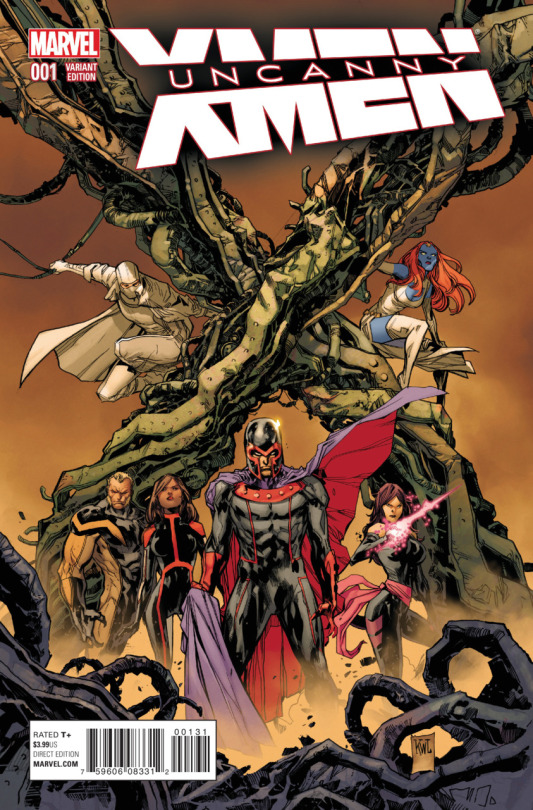
DC Comics New Line of Titles Going Strong - Now, Bring Back the Justice Society of America! It may have not been planned but many of this week's comics happen to take care of fathers and sons. That might not sound strange but if you consider classic comics there aren't many prominent father figures. Some of the most prominent super heroes don't possess dads. Superman's father is dead, ditto for Batman, Uncle Ben will be the closest thing to a dad Peter Parker had and now we truly realize what went down to him. I'm not even going to go near Silk Spectre's daddy issues. Is there a fundamental reasons why most superheroes will also be orphans?

I have already noted in a very previous article for the blog that the Men In Black will return in a third installment starring of course Will Smith in the role as 'J' as well as a younger version of Tommy Lee Jones by means of Josh Brolin obtaining the role as agent 'K'. The concept for Men in Black was originally pitched as a comic strip series to Malibu Comics fro which Columbia Pictures chose to option and the rest is history.
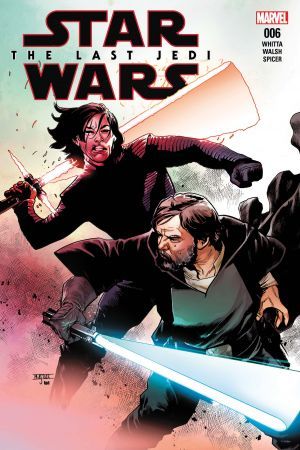
Fish Smarty is surely an interactive place where they gathered each of the most beautiful games, comic books and drawings for the children, a kind of educational portal for youngsters aged between 3 and 20 years that provides education through fun and laughter. In other words, children think they play, actually what they do, nevertheless, you parents, you can rest assured that playing is in fact pure education.
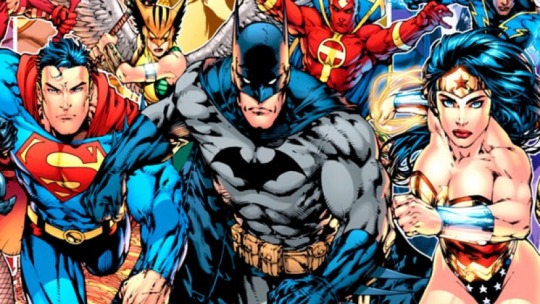
The last option will seem obvious for some, and not so obvious to others, which is a thrift store. They are also generally known as second-hand stores, plus they will have a wealth of comics at around a few cents each. In fact, a lot of people have discovered hundred dollars comic books for a couple of bucks, and also have gone to sell big around the resell market. Superhero comics have become a fundamental portion of modern pop culture, as well as their popularity shows no signs and symptoms of fading in the near future. As more and more people understand these characters from other appearances in blockbuster movies, the demand for comic books featuring these heroes has risen. With these affordable reprint volumes, everyone can easily catch up on years of their best hero's adventures.
0 notes
Text
Superhero
Need to purchase X-Men t-shirts on-line? Whether or not you have got a love for The Avengers, Unbelievable Four, Thor, or X-Men there are a lot or t-shirts and different merchandise to personal. My childhood included a love for 60s and 70s Marvel and DC comics, and my capacity to attract originates partially from learning the tales I learn in those days. We labored for a yr collectively on the piece to plan and draw it. Toy corporations like Hasbro and Kenner used to produce hundreds of Batman motion determine than is launched every year with some variation in it. Transformers 2, the science-fiction film is the latest sensation, and is the most awaited movie of the yr. Let's take the film Avatar for instance. Now and again I went again to the game to take just a few more screenshots to increase a plot. Inside a couple of minutes, I started making comedian strips. Unlike his different comic strips, in Battling Boy, the hero is a child, who's on a mission to save the town.
In truth, the opposite sequence of battling boy grew to become well-liked. To conclude on this matter, I feel it's an excellent idea to offer our children the humorous comics created manner-back-when, comics from your and my childhood. To learn a narrative in adventurous manner is quite thrilling for all the kids. You have to overcome the limitations of speech bubbles and the issue of telling a narrative frame by frame. Admit it you've got! I’m certain you have heard this standard on-line retailer. Since Kids's Graphic Novels are actually simply an outdated concept with a fancy new title, why should not you discover taking old successful comicbook ideas and reinventing them for a brand new technology? The idea was to convey the same which means with phrases that I instructed by way of colors, textures and pictures. Fashionable On-line Comics solidify a which means of a phrase because footage help meaning to phrases. The nomination was a serious achievement for an artist who had - fairly actually -started out small, drawing Post-it be aware sized comics and hiding them in different people’s work in bookshops. The primary comic strips appeared in Germany in 1865. It was about two boys who're getting punished for at all times entering into mischief.
Moreover, if we're sincere with ourselves, we all know that loads of mischief is downright funny. Why are old coins worth more than right now's coins? Full collections will fetch too much greater than random individual comics. Our goal is to provide our readers a great piece of entertaining and academic comics on which is able to develop up not one of the long run generations. These blockbuster motion pictures plays an important function in the comeback of comics. People who need to cherish their childhood memories with the comics; they'll easily discover cheap comics to start their comic assortment. In this day of "I need the newest and latest," we actually discover that a few of the actual treasures are things of outdated. Comedian books are detailed tales. Other than conventions, yard sales and used guide shops can also be extremely value efficient sources for collectible comic books. A comic book adaption as well as a novel publication is being finished for the film's promotion. That assumption is unsuitable and is an insult to the entire comic book neighborhood.
These comic guides give you the type of data you want like the place to get the rare and valuable comics and where you will get first situation comics as properly as the back subject ones as properly. By selling and trading comics you might be there have been the art work is most loved and valued. Moreover, that's where you get the meet fellow enthusiasts and catch up on the most recent within the comic books world; info that can show invaluable. Some comic books editions are collector's items and if preserved in mint quality situation. Books are restricted because the reader cannot bodily see what the writer envisions. Are these behaviors to be condoned? Eyes turn into circles or dots, mouths are reduced to curved lines, and noses or ft are triangles. Get the newest news. Those that already consider extensive abilities of our website, confess that it is actually probably the most handy and simple approach to be in touch with the newest innovations of the world of comics.
Effectively conscious of the benefits that come from reading comics. Which Marvel comics must you read before (or after) Captain Marvel? Repetition. Go back to your day by day newspaper and look at the comics’ page. The cartoonist is utilizing repetition to identify the character. Due to this fact, we may say that it has nothing to do with a altering traits, whatever is new and trendy, photograph to pop art print remains within the midst of its recognized usability in subject of art. I appeared, and there before me was a pale horse! There really is something for everyone. Cosplay additionally means costume play and the followers typically come to the comic conventions dressed in costumes. Eight delectable Expansions that followed added to the joy of the sport play. Then by all means, use it. By the use of these exaggerations, it doesn’t matter what other details I embody. The possessed doll first hit the screens in the 1988 horror classic 'Kid's Play'. Corey Haim, the lead of the unique horror movie, and Corey Feldman, the 2 Coreys, reprise their unique roles. Nevertheless, in 2003 Hasbro would relinquish control to Batman's rights to Mattel. You additionally get preferential therapy in some instances and entry to particular events and performances. Is Bronze Age Comic Investing A Good Choice? The Future of Bronze Age Comic Book Investments!

When we speak about superheroes, something that comes into thoughts are Batman. This crime fighting, caped crusader has become a section of us because it was released in a Superman very comic book series. Most of us have few ideas about him like his name, his sidekick, villains, with his fantastic cool gadgets. But only a number of us learn about certain details of the dark knight. In this article, will speak about who is Batman based on more interesting information about this superhero. 1. The Hulk - This teammate is brilliant and analytical, but moody and temperamental. At her best she tackles probably the most difficult difficulties with precise analysis. She has a grasp of complicated issues and has a reasoned and systematic procedure for them. She is, however, easily upset and will become quite the "monster" when angry. The best approach for that team is to allow her to work alone, whenever you can. Solitude permits her to pursue potential solutions because they eventually her. She ought to be needed to keep another teammate appraised of her work. Because of her logical nature, she'll usually respond positively while confronting facts that disprove her position. However, when she flashes her temper, teammates informed about her will simply get out of just how. After she has calmed down she should be made conscious of the unacceptability of her angry behavior.

While becoming an adult there were this extremely tiny comic shop inside the town I spent my youth, also it was alone in the city. I remember seeing an Amazing Spider-Man #1 about the wall as well as an X-Men #1. Both were in great (VG) condition, without doubt. I remember specifically that the Amazing Spider-Man #1 was being sold for $800 and The X-Men #1 went around $300.

With this as a reboot, each goes straight away while on an origins story. If you're a fan of Spider-Man otherwise you know his beginnings, then you certainly ought to know a number of what you should expect. I'm sure the creators on this movie are stored on to the fact so in retrospect they've added some wrinkles for this existing comic classic. By adding some unfamiliar parts towards the story and subtracting a few of the things we've grown familiar with, the movie is allowed to feel fresh as well as new in some ways.

Superhero comics are becoming a fundamental element of modern pop culture, along with their popularity shows no signs of fading in the near future. As more and more people familiarize yourself with these characters from their appearances in blockbuster movies, the requirement for comic books featuring these heroes has risen. With these affordable reprint volumes, anyone can easily compensate for numerous years of a common hero's adventures.
0 notes
Text
Lando Calrissian Ponders a Very Important Baby Gift in This Excerpt From Star Wars Aftermath: Empire's End
One of the most significant events between Return of the Jedi and The Force Awakens is the birth of Han and Leia’s son Ben. In this exclusive excerpt from Empire’s End, the final installment in Chuck Wendig’s Star Wars: Aftermath trilogy, it turns out Lando’s been a bit too busy to pay much attention to his old friends or their babies.
The Aftermath novels have been chronicling the continued fall of the Empire and rise of the New Republic following the Emperor’s death. While they primarily follow a small group of rebels who hunt for missing Imperial officers (and occasionally Han Solo, when he goes missing), each book checks in with characters all over the galaxy; in Empire’s End, due out February 21, that includes Lando. In this excerpt, he recollects how he took back Cloud City, but also has the best idea for a baby gift in any galaxy.
First, here’s the official synopsis of the book:
EVERY END IS A NEW BEGINNING.
As the final showdown between the New Republic and the Empire draws near, all eyes turn to a once-isolated planet: Jakku.
The Battle of Endor shattered the Empire, scattering its remaining forces across the galaxy. But the months following the Rebellion’s victory have not been easy. The fledgling New Republic has suffered a devastating attack from the Imperial remnant, forcing the new democracy to escalate their hunt for the hidden enemy.
For her role in the deadly ambush, Grand Admiral Rae Sloane is the most wanted Imperial war criminal—and one-time rebel pilot Norra Wexley, back in service at Leia’s urgent request, is leading the hunt. But more than just loyalty to the New Republic drives Norra forward: Her husband was turned into a murderous pawn in Sloane’s assassination plot, and now she wants vengeance as much as justice.
But Sloane, too, is on a furious quest: pursuing the treacherous Gallius Rax to the barren planet Jakku. As the true mastermind behind the Empire’s devastating attack, Rax has led the Empire to its defining moment. The cunning strategist has gathered the powerful remnants of the Empire’s war machine, preparing to execute the late Emperor Palpatine’s final plan. As the Imperial fleet orbits Jakku, an armada of Republic fighters closes in to finish what began at Endor. Norra and her crew soar into the heart of an apocalyptic clash that will leave land and sky alike scorched. And the future of the galaxy will finally be decided.
And here’s the excerpt. We hope Lando actually got baby Ben the gift. Or maybe that’s what turned him to the Dark Side?
“Lobot, we’re home.” Lando lifts a dubious eyebrow as he looks around, exasperated. “Guess the Empire didn’t keep up with housekeeping.”
This is the Casino level. Game machines line the smooth blue alactite floors far as the eye can see. Sabacc tables, too. And pazaak. And jubilee wheels. Along the far wall are banks of holoprojectors meant to show the latest swoop race down on the track-tubes piped through Bespin’s toxic Red Zone atmosphere. Once, this was a shining pillar of gambling excess: classy and bright with light coming in through windows looking out over the sun-kissed clouds. Now it’s wrecked. Trash drifts and tumbles. Machines have been turned over, their credits cut from inside like food from a beast’s belly. The windows are covered over with metal. The holoprojectors are dark. Lobot steps up alongside Lando. The computer forming a half-moon around the back of the man’s bald head blinks and pulses, and at Lando’s wrist is a communication from his friend and cohort:
I’ll look into rehiring staff immediately.
“Do that,” Lando says. Then he thrusts up a finger. “Ah. But make sure we’re hiring some refugees, will you?” The galaxy’s like a cup that’s been knocked over, and now everything’s spilling out. Whole worlds have been displaced by the war. Lando can’t let Cloud City turn from being a city of luxury to being a tent city of expats and evacuees, but he can damn sure give those people jobs. That’s his favorite kind of arrangement: the kind where everybody gets something for their trouble. They win. He wins. The ideal for how everything should work.
Cloud City was always that, for Calrissian. It was a respite—a refuge from the Empire while at the same time not existing to spite the Empire, either. He thought, Hey, everybody can be happy, baby. The Empire didn’t have to care. The rebels didn’t need to care. Cloud City could hang in the air above Bespin, separate from all the chaos, from all the strife. Come here, taste a little luxury. Meanwhile, he could mine the Tibanna gas, sell it to whatever starship manufacturer wanted it (the stuff was perfect for making hyperdrives, because with Tibanna, a little went a long way). Meanwhile, Lando could sit back, have a drink, roll some dice, find a lady or three.
Yeah. It didn’t work out that way.
He knows now: In a war like this one, you don’t get to be in the middle. You can’t play both sides. He’d lived his whole life shooting right down the middle, never taking up a cause except the one meant to support his own empty pockets. Those days are over and so is his love of sweet neutrality. When Vader came here, everything changed. He lost Han, for a time. He lost Lobot and Cloud City. He lost nearly everything.
But he gained a little perspective.
And he picked a damn side. Because sometimes, you want to win, you gotta bet big. You gotta put your stack of chits in one place.
It paid off. The Empire is gone. And now he’s a hero of the Rebellion (and oh, you can be sure he used that to con more than his fair share of free drinks, not to mention the attention of beautiful admirers). But all he wants is his city back. After Endor, he thought he would just be able to sweep in here like a handsome king retaking his throne in the sky—but then that son-of-a-slug Governor Adelhard formed the Iron Blockade. He kept the people here trapped not only by a well-organized Imperial remnant, but also by a grand lie: that Palpatine was not dead. And Lando knows that old shriveled cenobite is dead—because he’s the one who took out the Death Star’s reactor core. And because Luke said the monster was dead. Can you believe it? Palpatine and Vader. Both gone. Two scourges, scoured from the galaxy.
Suddenly he had a second war to fight. Here he thought the Empire was done for and Cloud City was once again his. What an eager fool. Nothing’s ever that simple, is it? It took months and months. He had to stage an uprising. Had to interface with Lobot on the inside. Had to cash in favors with a handful of scoundrels—like Kars Tal-Korla, that pirate. All because the New Republic wouldn’t commit a military action to retaking the city. He respects it, he understands it, and Leia put it best when she said, “The Rebellion was easy, Lando. Governing’s harder.” The chancellor was just trying to hold on to whatever advantage she had—and then with the Liberation Day attack on Chandrila . . .
Well. All that is over and done. No need to dwell.
Cloud City is his once again. Lando starved out Adelhard. Most of the Imperials surrendered. It’s over. Thank the lucky stars.
He steps forward into the Casino level, and he and Lobot aren’t alone. He’s got a ragtag force with him: some of his Wing Guard security forces, but some New Republic soldiers, too. It’s just enough to perform cleanup on those who linger behind, clinging to the illusion they can still win this thing.
Together they march forward through the wreckage of the Casino level. He asks Lobot: “The holdouts are ahead?”
Yes. In the Bolo Tanga room.
“Fine, fine, let’s get this over with and evict our final tenants.”
As they walk, Lobot looks over at him as a new communication flashes across his wrist: I am told to remind you that the princess will soon give birth and you have not yet procured for them the standard natal gift.
“What? That’s impossible. She was just—I swear they just got married—didn’t I just get them a nuptial gift?”
It has been the proper biological time. You just do not realize how much time has passed. We have been busy.
“So have they, I guess.”
Also, you never got them a nuptial gift.
He sighs. “Okay, okay. Buying gifts for a kid. Can we get him a cute little cape and a mustache so he looks like old Uncle Lando?”
Lobot doesn’t respond, offering only a humorless stare.
“Fine, fine, I’ll think about it.” His mind drifts briefly to Han and Leia. Han, one of his oldest and greatest friends. And sure, one of his greatest rivals, too. He misses that old reprobate. The crazy times they had!
Good times even when they were bad. And now, Han is with Leia. Hoo, boy. Those two are a pair of rocket boosters firing full-bore. Lando just hopes those two engines are both firing in the same direction—because if they’re ever pointed at each other, they’ll burn each other up.
We’re here.
That, from Lobot. Ahead waits the door to the Bolo Tanga room. Lando can see it’s been sealed with mag-alloy. He turns to Captain Gladstone of the Wing Guard. “We got imaging?”
Gladstone nods. “They’re holed up in there. They’ve broken through to the beam outtake shaft, which in theory would lead them to the engineering sublayer—”
“But the fumes coming up through the shaft will kill them if they try.”
“That’s exactly it, Baron Administrator.”
“So they’re trapped.”
“Like crete-bugs in a beetle-bag.”
“All right, let’s open it up.”
From the book STAR WARS: AFTERMATH: EMPIRE’S END by Chuck Wendig. Copyright © 2017 by Lucasfilm Ltd. Reprinted by arrangement with Del Rey Books, an imprint of Random House, a division of Penguin Random House LLC. All rights reserved.
$19
From amazon
6 purchased by readers Gizmodo Media Group may get a commission
13 notes
·
View notes